 12/11/2009 04:19 12/11/2009 04:19 |
|
| | | OFFLINE | | Post: 18.844
Post: 1.492 | Registrato il: 28/08/2005
Registrato il: 20/01/2009 | Administratore | Utente Veteran | |
|


 Can't wait to find out how this 'production' turned out.... I don't feel very comfortable about the way the record company is hyping it, somehow sounds misleading, but this preview sounds like it could be quite a creative mix....
New CD with Pope's voice
Can't wait to find out how this 'production' turned out.... I don't feel very comfortable about the way the record company is hyping it, somehow sounds misleading, but this preview sounds like it could be quite a creative mix....
New CD with Pope's voice
previewed in Rome
By Cindy Wooden

ROME, Nov. 11 (CNS) -- Under the gilded ceiling of a Roman basilica, a choir performed while the taped voice of Pope Benedict XVI sang the Marian hymn "Regina Coeli" ("Queen of Heaven").
The performance marked the press launch of "Alma Mater," a CD featuring the recording of the Pope leading the "Regina Coeli" prayer in St. Peter's Square on May 1, 2005, the first time he had led the hymn as pope.
The CD features eight pieces. They each begin with six lines from the Marian Litany of Loreto and then segue into a new composition of classical music with the Pope's voice overlaid, usually reciting a Marian prayer or talking about Marian devotion.
The disc was co-produced by the Pauline Fathers' Multimedia San Paolo and Geffen Records, which is part of Universal Music Group. It was scheduled for worldwide release Nov. 30.
Pauline Father Vito Fracchiolla, general director of the order's publishing companies in Italy, said the disc "is the fruit of the convergence of many artists and of many business and church entities, a result of teamwork aimed principally at making a gift to Pope Benedict XVI" by spreading his Marian devotion and a message of hope".
Colin Barlow, president of Geffen Records UK, said, "The beauty of this record is that it celebrates the beauty of music."
The disc features the choir of the Philharmonic Academy of Rome singing in St. Peter's Basilica under the direction of Msgr. Pablo Colino and London's Royal Philharmonic Orchestra playing under the direction of Charles Dutoit.
Geffen and the Paulines held a press conference in Rome's City Hall Nov. 10 before inviting the media to listen to the Rome choir sing selections from the album in the Basilica of St. Mary Ara Coeli.
The recordings of the Pope's voice are the property of Vatican Radio, which for a fee of 25,000 euros (about $37,600) gave the Paulines permission to use 9 minutes and 49 seconds of the pope's voice, said Jesuit Father Federico Lombardi, head of Vatican Radio.
The Jesuit, who also directs the Vatican Television Center, said the Vatican also made six of its video clips of the Pope available to the project for a fee of 6,580 euros (about $9,900) for use during "Alma Mater" concerts and in publicity material.
Father Lombardi said the disc is an affirmation "that art is the natural ally of the spirit in a way that goes beyond religious affiliation," as seen in the fact that the composers, producers and musicians include Christians of various denominations, a Muslim and nonbelievers.
The Jesuit, who also serves as Vatican spokesman, said he believed Pope Benedict had received a copy of the CD and had listened to it, but he had not heard the Pope's reaction.
The decision of Vatican Radio and the Vatican Television Center to allow the Paulines to use the pope's voice and image was approved by the Vatican Secretariat of State, Father Lombardi said.
The approval came because of Pope Benedict's interest in "finding and experimenting with new ways and means for transmitting a religious, spiritual message in this world that needs it so badly. And also to find new ways to bring the voice and the person of the pope closer to a wider public," he said.
"Music is an effective language for communicating today with a vast public of young people, and not only with them," he said. "And the creative effort of allying both traditional and modern music with wise and spiritual words is certainly worthy of respect and encouragement," Father Lombardi said.
Even after agreeing to the project, the Vatican reserved the right to approve how the pope's voice and image were used and stipulated that Geffen was to donate a portion of its profits to charity, he said.
Asked why Vatican Radio would allow a commercial enterprise to use the pope's voice for such a modest fee, Father Lombardi said the radio is a service aimed at spreading the pope's message, not making money. "But if Universal and the Paulines make colossal profits and want to make a donation out of gratitude to the Pope or to Vatican Radio, I wouldn't refuse it," he said.
Trivia: A similar album with John Paul II's participation was apparenrly titled ABBA PATER, for the Jewish and Latin terms meaning 'father' Rather clever of the Geffen REcord boys to come up with the new CD's name...
The OR has a brief factual item about the CD presentation in today's issue (11/12/09):
'Alma Mater' CD is presented
Translated from
the 11/2/09 issue of

On November, 10, the CD Alma Mater: Music from the Vatican was presented in Rome.
It is a co-production of Geffen UK and Multimedia San Paolo, with the voice of Benedict XVI taken from recordings provided by Vatican Radio.
The disc contains eight new compositions executed by the Choir of the Accademia Filarmonica Romana, under Pablo Colino, and by the Royal Philharmonic Orchestra.
The music was composed by Simon Boswell, Nour Eddine and Stefano Mainetti, at the request of the man who came up with the concept for the CD, Fr. Giulio Neroni.
The music was added to the voice of Benedict XVI who chants and prays in different languages, similar to what was done for John Paul II in the CD Abba Pater.
The CD will be released internationally on November 30.
A really beautiful promotional video on
www.musicfromthevatican.com/
allows us to hear the excerpt with the Pope
intoning the 'Regina caeli' from one of his
first Angelus-hour prayers as Pope.
[Modificato da TERESA BENEDETTA 13/11/2009 15:05] |
| |
|
| |
 12/11/2009 14:11 12/11/2009 14:11 |
|
| | | OFFLINE | | Post: 18.845
Post: 1.493 | Registrato il: 28/08/2005
Registrato il: 20/01/2009 | Administratore | Utente Veteran | |
|
 Thursday, Nov. 12
Thursday, Nov. 12
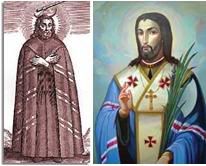 St. Josaphat (b Lithuania 1584, d Russia, 1623
St. Josaphat (b Lithuania 1584, d Russia, 1623
Bishop and Martyr, Patron Saint of the Ukraine
Born around the time that the Church of Ruthenia split, with some
Orthodox returning to communion with Rome (Uniates), he grew up
a Uniate, with a reputation for holiness even as a boy. He became
a Basilian priest, well-schooled and ardent in preaching the Catholic
faith. After heading many monasteries, he became Bishop of Vitebsk
at age 38. His preaching converted many orthodox to Catholicism,
including Ignatius, Patriarch of Moscow, and a descendant of the
Paleologue emperors. He was murdered by a mob in Vitebsk who
supported a dissident hierarchy that had developed against him.
Lying in state, his body had the odor of sanctity and was incorrupt
when it was exhumed five years later. His remains were later taken
to Rome where he is buried in St. Peter's Basilica. Hos body was
exposed intact in 1797. In 1867, he became the first Eastern saint
to be canonized in the Latin rite.
OR today.
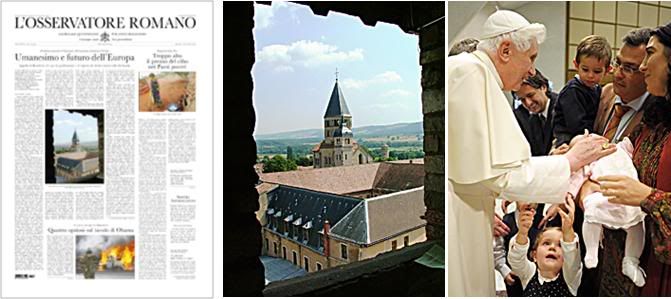
At the General Audience, the Pope describes the monastic experience of Cluny:
Humanism and the future of Europe
He also appeals for rapid pacification and humanitarian help to victims of Sri Lanka's long civil war
Other Page 1 stories: The FAO reports that food prices are too high in the poor countries; and President Obama considering
four options for moving forward in Afghanistan. Inside, there are excerpts from lectures given by two leading Curial prelates
at a seminar revisiting John Paul II's encyclical Fides et ratio.
THE POPE'S DAY
The Holy Father met today with
- H.E. Stjepan Mesić, President of the Republic of Croatia, and his delegation
- Bishops of Brazil on ad-limina visit (Group 3 of the second batch; the first batch were seen in September
before the Pope's visit to the Czech Republic)
- Professors and students of the Universita Libera Maria Santissima Assunta (LUMSA) in Rome on the 70th
anniversary of its foundation. Address in Italian.
Yesterday, after the General Audience, the Pope met with
- Cardinal Paul Josef Cordes, President of the Pontifical Council Cor Unum
|
| |
 12/11/2009 15:04 12/11/2009 15:04 |
|
| | | OFFLINE | | Post: 18.846
Post: 1.493 | Registrato il: 28/08/2005
Registrato il: 20/01/2009 | Administratore | Utente Veteran | |
|
|
| |
 12/11/2009 18:57 12/11/2009 18:57 |
|
| | | OFFLINE | | Post: 18.847
Post: 1.495 | Registrato il: 28/08/2005
Registrato il: 20/01/2009 | Administratore | Utente Veteran | |
|

 Perhaps no other living personality today, or even in the decades since the end of World War II, has commented more often, more analytically and more consistently about the crisis of Europe - in its cultural identity, in its demographic reality, in standing up to the overt challenge of Islam and the risk of becoming 'Eurabia' - than Joseph Ratzinger before and since becoming Pope.
Perhaps no other living personality today, or even in the decades since the end of World War II, has commented more often, more analytically and more consistently about the crisis of Europe - in its cultural identity, in its demographic reality, in standing up to the overt challenge of Islam and the risk of becoming 'Eurabia' - than Joseph Ratzinger before and since becoming Pope.
His passionate personal concern, as well as the Church's own institutional concern, on this issue, has virtually made him the Prophet of Europe, and unquestionably had to do with his choice of his papal name in homage to St. Benedict who saved Christian Europe in the Middle Ages. He may well be Europe's 'new Benedict' - and once again, it is remarkable that it takes a man of God, and not any one of the world's self-trumpeting intellectuals and political leaders, to defend a way of life that is primarily 'temporal' after all, to the secular mind.
This article comes from Avanti, the official daily newspaper of the Italian Socialist Party since 1896.
The successes of Benedict XVI
and the 'blindness' of Europe
by ANDREA CAMAIORA
Translated from

November 11, 2009
Do religion and spirituality have any political fallout? Are they somehow related to political reasoning? The late don Gianni Baget Bozzo thought so, and his entire life and thinking demonstrated that.
On the other hand, all who believed - and one thinks especially of the defeated Communist regimes of eastern Europe - that they could simply cast out God and man's tendency to seek the Infinite, have been proven wrong by the irresistible power of Catholicism, embodied by the unique figure of John Paul II.
But there are those on the left who, even if they do not advocate the materialistic culture, pre-and post-Communist era, continually see a political content in anything that the Church of Rome does under the Pontificate of Benedict XVI.
That is the case with Massimo Faggioli, a scholar of religious history, who had an article on oct. 28 in the Partito Democratico's newspaper Europa, entitled "The PD and Benedict's Latin". [The PD is a political party formed earlier this year by leading Catholic leftists under the former mayor of Rome, Walter Veltroni, and was soundly defeated by Silvio Berlusconi's center-right coalition in the April parliamentary elections.]
For Faggioli, "the theological debate over the Second Vatican Council directly affects 'democratic Catholicism' and its culture as an important and not simply residual part of the political scenario".
In effect, Faggioli has noted how Benedict XVI's Magisterium is demolishing the cultural assumptions of that 'democratic Catholicism' [i.e., leftist Christian Democrats, in the term more commonly used] , which flourished under the Pontificate of John XXIII and then through part of Paul VI's.
Naturally, Faggioli - who also writes editorials for the PD organ - defends the artifices resulting from Vatican-II and condemns the present Pope because "even if the Vatican-II fathers had no political objectives in mind when they debated the documents that 'updated' the Catholic Church, every step back taken by the church of Benedict XVI from the acquisitions of Vatican-II launches, in fact, a political message".
It looks like ultimately, Europa and the PD have not learned their lesson. They are concerned for the 'democratic Catholicism' of the politicians who describe themselves as 'adult Catholics' because the Pope 'has put them aside' [when it was the voters who did], and therefore, it is the Pope who has erred.
The truth is that spirituality, culture, politics are all inter-related. Baget Bozzo's lesson has still not been learned by the left, which continues unperturbed to make mistakes.
However, the issue raised by Europa deserves to be pursued, looking at Benedict XVI's Pontificate and how it has progressed so far.
Within the space of a few months, Joseph Ratzinger has been able to cross over the threshold of Hope: for a Christianity that may once more be united around the primacy of Peter.
In this respect, only a theologian like Hans Kueng, who calls himself 'Catholic', could criticize Benedict XVI as harshly as he did upon the announcement of a rapprochement between traditional Anglicans and Rome.
Kueng claims that the Pope's only intention is to 'restore the Roman empire", or to maintain 'Rome's medieval centrality'.
It is sad to note the biased attitude of the Swiss theologian, though his article has been published integrally so far only in La Repubblica and The Guardian [also Le Monde], which perhaps says something.
How can Kueng not see reality? In a few months, Benedict XVI - with his openings to the Lefebvrians and the Anglicans - has made different signals that point to only one direction. As L'Osservatore Romano said in an editorial: it is "to reconstitute the unity desired by Christ and to acknowledge the long and effortful ecumenical journey that has been achieved so far for this end".
Of course, the Pope's work does not end here. He has other thresholds to cross. One is in the north, the other east.
The German evangelicals have chosen a woman to continue dialog with the Catholics from a strong common platform: a value-driven intransigence on bioethical issues.
And in the east, the theological dialog with the Orthodox Churches is on track [having now arrived at discussing the role of the Pope in a reunified Church]. Even in this, how can one miss the hand of Benedict XVI?
The recent theological session in Cyprus marked an important step, looking to an extraordinary resumption in Vienna next year [the sessions have always been biennial, every two years, since they began in 1980]. where their host will be Cardinal Christoph Schoenborn who is closely associated with Benedict XVI.
It is incumbent on the Italian government - which is doing fairly well in its European relationships [except for Brussels and Strasbourg constantly trying to oppose Italian practices and laws based on the country's Catholic traditions, which date to the beginnings of the Church] and its relations with Russia - to take note of Benedict XVI's successes.
[Perhaps an unnecessary suggestion, since both President Napolitano and Prime Minister Berlusconi have certainly been very attentive to what the Pope says and does. Perhaps the writer meant Italian politicians in general, such as the obstinate PD.]
Now, how serendipitous is it that having commented in my introduction to the above article on Joseph Ratzinger/Benedict XVI as the 'Prophet of Europe' and 'the new Benedict for Europe', there was this article today that developed that very theme!
A ‘different Benedict is here’:
Benedict XVI and the new missionary age
The voices of those who wanted to place him in a terminological box have receded.
This is a prophetic Pope with an inspired and historic mission that has only just begun.
By Deacon Keith Fournier

11/12/2009
Catholic Online
History shows that the earliest days of a Papacy often send a signal for the watchful observer. We are told by some to pay attention to the name chosen by the new Pope and the content of their first messages. I vividly recall the first days of our current Pope’s service to the Church and the world. Joseph Cardinal Ratzinger chose the name Benedict.
One of the young priests who commentated on this choice during the televised coverage of those extraordinary days noted that the new Pope had visited Subiaco before all the events even began. Subiaco is the home of the Benedictine monastic movement. It symbolizes the Christianization of Europe during the First Millennium.
Saint Benedict was born around the year 480 in Umbria, Italy. He is the father of Western Monasticism and co-patron of Europe (along with Saints Cyril and Methodius).
As a young man, Benedict fled a decadent and declining Rome for further studies and deep prayer and reflection. He gave his life entirely to God as a son of the united Catholic Church. He traveled to Subiaco. That cave became his dwelling, the place where he communed deeply with God.
It is now a shrine called "Sacro Speco" (The Holy Cave). It is still a sanctuary for pilgrims, including Pope Benedict XVI, who visited that very same place of prayer right before his election to the Chair of Peter.
St. Benedict lived a life of prayer and solitude for three years and studied under a monk named Romanus. His holiness drew other men and women and soon, twelve small monasteries were founded. He later traveled to Monte Cassino, where he completed his "Rule for Monks." From those Benedictine monasteries, an entire monastic movement, a lay movement in its day, was birthed and the world was changed through it.
It was this movement which led to the evangelization of Europe and the emergence of an authentically Christian culture. This Culture was the fertile soil for the birth and flourishing of the academy, the arts and the emergence of what later became known as Christendom.
In April of 2005, Joseph Cardinal Ratzinger, a man of letters, professor and ardent student of Church history assumed the Chair of Peter as Pope Benedict XVI. Shortly after this momentous event, I wrote a lengthier article on the possible implications of his election containing a quotation from the philosopher Alisdair MacIntyre, taken from his book After Virtue:
It is always dangerous to draw too precise parallels between one historical period and another; and among the most misleading of such parallels are those which have been drawn between our own age in Europe and North America and the Epoch in which the Roman Empire declined into the Dark Ages.
Nonetheless, certain parallels there are. A crucial turning point in that earlier history occurred when men and women of good will turned aside from the task of shoring up the Roman Imperium and ceased to identify the continuation of civility and moral community with the maintenance of the Imperium.
What they set themselves to achieve instead - often not recognizing fully what they were doing - was the construction of new forms of community within which the moral life could be sustained so that both morality and civility might survive the coming ages of barbarism and darkness.
If my account of our moral condition is correct, we ought also to conclude that for some time now we too have reached that turning point. What matters at this stage is the construction of local forms of community within which civility and the intellectual and moral life can be sustained through the new dark ages which are already upon us.
And if the tradition of the virtues was able to survive the horrors of the last dark ages, we are not entirely without grounds for hope. This time however, the barbarians are not waiting beyond the frontiers; they have already been governing us for quite some time. And it is our lack of consciousness of this that constitutes part of our predicament.
We are waiting not for a Godot, but for another - doubtless very different - St. Benedict.”
I speculated that Pope Benedict XVI - who has since reminded us that the Church is a “creative minority” - was a response to the need expressed by MacIntyre for a “different Benedict”. I am even more convinced of it now.
In an age which has witnessed a decline in Christianity on the European continent, Pope Benedict XVI boldly calls for a rebirth of Christianity in Europe.
In an age which has been beset by disunity in the ranks of those who bear the name Christian, he has undertaken an extraordinary mission of Church Unity.
His prophetic and pastoral response to Anglicans seeking full communion in the safe harbor of the Catholic Church is one among several courageous and prophetic actions taken by this quiet, diminutive, and humble “servant of the servants of God”.
Others include his offer of reconciliation with the followers of Archbishop Lefebvre; his encouragement of the lay movements and ecclesial communities, the “monastic movement” of this Third Millennium; and his extended hand of communion toward the Orthodox Church which has as its goal the full restoration of ecclesial and Eucharistic communion which recognizes legitimate diversity within such a renewed communion.
This is a prophetic Pope who understands that there is no “Plan B”, the Church is the only hope for the recovery of a devastated West. Indeed she is the only hope for the whole world because she continues the redemptive mission of her head, Jesus Christ. She is His Body.
He will soon visit Europe [What on earth does Fournier mean?] in a series of near non-stop apostolic visitations [????] during his short tenure in office.
St. Augustine of Canterbury was sent to what became England by another great Pope St. Gregory, in 669, to bring freedom to the inhabitants of that beautiful land through the proclamation of the full Gospel of Jesus Christ as found within the Catholic Church.
Now, in the Third Millennium, the successor of Gregory is making the trip himself. The timing of the release of Anglicanorum Coetibus, the Apostolic Constitution establishing Personal Ordinariates for returning groups of Anglican Christians, is no accident. Nor is it the only historic overture toward authentic unity which this Pope of Unity will offer during his service.
The voices of those who wanted to place him in a terminological box have receded. This is a prophetic Pope with an inspired and historic mission that has only just begun.
Pope Benedict XVI participated in the Second Vatican Council. He not only understands the authentic teaching of that Council but has led the way in its proper implementation in many areas of life, both within the Church and in her mission to the contemporary age.
He also understands the way that the Council was hijacked in some circles, disregarded in others and misinterpreted in still others. However, his is a voice calling for a dynamically orthodox and faithful Catholic Christian faith, practice, worship and life that does not want to move us back but forward and toward.
In his homily prior to the convening of the conclave where he was chosen to fill the Chair of Peter, then Joseph Cardinal Ratzinger gave a prophetic insight into the challenges of the age:
How many winds of doctrine we have known in recent decades, how many ideological currents, how many ways of thinking...
The small boat of thought of many Christians has often been tossed about by these waves - thrown from one extreme to the other: from Marxism to liberalism, even to libertinism; from collectivism to radical individualism; from atheism to a vague religious mysticism; from agnosticism to syncretism, and so forth.
Every day new sects are created and what Saint Paul says about human trickery comes true, with cunning which tries to draw those into error (cf Eph 4, 14). Having a clear faith, based on the Creed of the Church, is often labeled today as a fundamentalism. Whereas, relativism, which is letting oneself be tossed and "swept along by every wind of teaching," looks like the only attitude (acceptable) to today’s standards.
We are moving towards a dictatorship of relativism which does not recognize anything as for certain and which has as its highest goal one’s own ego and one’s own desires.
Some attempted to misuse this prophetic insight to paint him as rejecting the modern world and somehow seeking to “turn the clock back”. That was nonsense.
What he rejects is the emptiness of what is called “modernity” and “post modernity”. What he proposes is a path to authentic progress; a road leading not to the past, but to a future of hope.
Authentic liberation can only be brought about through a new missionary age and a Rebirth of the Church. The Gospel - as taught by and lived in its fullness within the One, Holy, Catholic and Apostolic Church - is the only saving truth that redeems and brings about human flourishing, true freedom and authentic cultural recovery.
To proclaim this Gospel in its fullness to this Third Christian Millennium requires that the Church breathe with both of her lungs, East and West.
That is why Benedict is unqualifiedly dedicated to such a full communion of the Church, East and West. He calls it his “impelling duty”. He is the “Pope of Christian Unity” and he is the Pope of a new Missionary Age.
He knows that the "two lungs" on the One Body of Christ must breathe together again in order to animate this new missionary age with the full breath of the Holy Spirit which is needed to renew the Church and reform the world again in Christ.
Pope Benedict, like his namesake St. Benedict, has a vision for the Evangelization of Europe and the West. A “different Benedict” is here and a new missionary age has begun.
[Modificato da TERESA BENEDETTA 13/11/2009 15:02] |
| |
 12/11/2009 20:25 12/11/2009 20:25 |
|
| | | OFFLINE | | Post: 18.848
Post: 1.496 | Registrato il: 28/08/2005
Registrato il: 20/01/2009 | Administratore | Utente Veteran | |
|
|
| |
 13/11/2009 03:29 13/11/2009 03:29 |
|
| | | OFFLINE | | Post: 18.849
Post: 1.497 | Registrato il: 28/08/2005
Registrato il: 20/01/2009 | Administratore | Utente Veteran | |
|

 How much is B16
How much is B16
wired into IT?
Here's what CNA claims in a headline today:

Vatican City, Nov 12, 2009 (CNA).- The president of the Pontifical Council for Social Communications, Archbishop Claudio Maria Celli, shared this week that the Holy Father has an appreciation for new developments in technology and is comfortable surfing the internet and using e-mail.
During an interview with the program “Studio Aperto” on the Italia 1 TV network, Archbishop Celli added, while the Pope doesn't have a personal email address, he “sends his own personal emails. He does! He has great appreciation for new technology.”
The archbishop explained that while the Pope “cannot respond to the millions of messages that arrive in his inbox,” he is committed to “offering his prayers for all who write to him.”
“The Internet is an excellent means of communication,” he continued. “We are seeking to be present where the people are, especially the youth.”
Facebook, Wikipedia execs
brief Vatican on Web
By NICOLE WINFIELD

VATICAN CITY. Nov. 12 (AP) - Vatican officials and Catholic bishops are getting a lesson on the Internet from Facebook, Wikipedia and Google executives as the Church struggles to get its message out in the digital age.
A four-day symposium in the Vatican which opened Thursday also will address Internet copyright issues and hacking — including testimony from a young Swiss hacker and an Interpol cyber-crime official.
The meeting is being hosted by the European bishops'smedia commission and is designed to delve into questions about what Internet culture means for the Church's mission and how the church communicates that mission to others.
Pope Benedict XVI has tried to bring the Vatican into the Internet age and launched a YouTube channel earlier this year. Officials say he also e-mails and surfs the Web.
But the Vatican's online shortcomings have been woefully apparent.
Earlier this year, Benedict made clear he was disappointed that Vatican officials hadn't done a simple Internet search to discover the Holocaust-denying comments of an ultraconservative bishop before the Pontiff lifted his excommunication.
The outrage over the rehabilitation of Bishop Richard Williamson, of the traditionalist Society of St. Pius X, prompted Benedict to write a letter to his bishops admitting mistakes and saying that he had "learned the lesson" and that the Vatican would in the future pay greater attention to the Internet as a source of news.
French Bishop Jean-Michel di Falco Leandri, president of the European Episcopal Conference's media committee, cited the Williamson affair in his remarks to the opening session, saying it exposed the institutional Church's communications problems.
He also cited the outcry over the Pope's own controversial comments that condoms are not the answer to Africa's AIDS epidemic and could make it worse. He said the Catholic Church must learn how to communicate in a more effective, instantaneous way — recognizing how its pronouncements are taken in different cultures — if it wants to engage the faithful to spread its mission.
[I think the French bishop is oer-simplifying the problem. Much of the miscommunication is because the secular media on which 'the world' depends for its information often miscommunicate and misrepresent news about the Church, especially news about the Pope.
The Vatican provides the primary sources - radio and TV coverage and recordings, as well as text postings . But secular media ourlets never use this material as is: they need it pre-processed and pre-digested to the bare minimum that they wish to accommodate, and so they simply pass on the reports that they can get from the international news agencies and some of the major media that have their own correspondents, which necessarily reflect all of the secular (usually liberal) biases and assumptions of their reporters.]
"You either know how to communicate or you don't; you are either credible or not," he said, according to his prepared remarks. "You are either alive, or a fossil; you either know the language of the Internet or you don't, in which case you can't communicate." [With these statements, the bishop is also being quite condescending! Did he never stop to think how that might sound specifically addressed to the Pope??? - as I imagine he directed his remarks to the Church as a whole, from which you cannot dissociate the Pope!]
The stakes are high, he said, noting that Evangelical Web sites in France attract far more users than Catholic ones, even though there are far fewer Evangelicals than Catholics in the country.
The reason? Unlike Catholic sites, which are merely extensions of parish bulletins, Evangelical sites "seek to reach Internet surfers, using the Internet as a tool and a vehicle for evangelization," he said, tapping into a widespread concern at the Vatican about the competition for souls that Evangelical churches represent.
During the symposium, panels will discuss social networks, the Web generation, the church's communication strategies, and whether the Internet is changing religious practices.
In many ways, the Internet is just the latest means that the Vatican has used to spread its message, starting with parchment, printing press, radio and television.
Pope John Paul II used mass media and information technology to get out his message, overseeing the 1995 launch of the Vatican's Web site, www.vatican.va, which today includes virtual tours of the Vatican Museums and audio feeds from Vatican Radio.
[Modificato da TERESA BENEDETTA 13/11/2009 15:04] |
| |
 13/11/2009 04:09 13/11/2009 04:09 |
|
| | | OFFLINE | | Post: 18.850
Post: 1.498 | Registrato il: 28/08/2005
Registrato il: 20/01/2009 | Administratore | Utente Veteran | |
|

 Pope commemorates 70th anniversary
Pope commemorates 70th anniversary
of Rome's LUMSA University

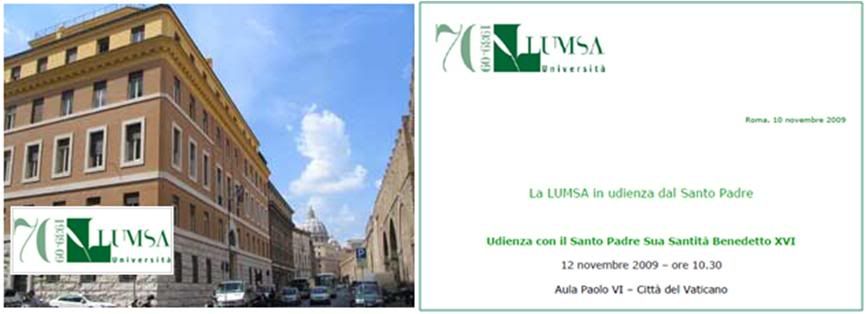
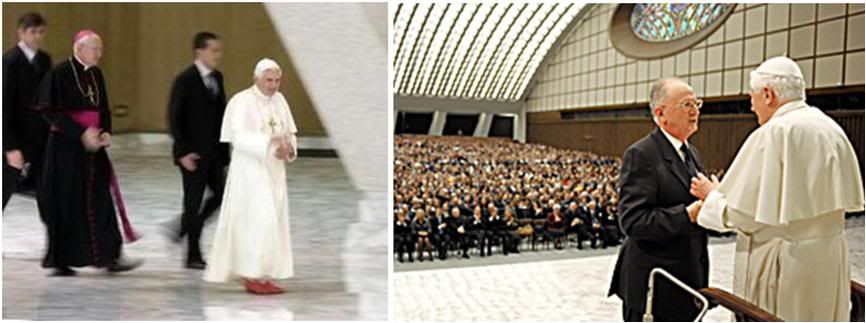
Vatican City, Nov 12, 2009 (CNA).- In commemoration of the 70th anniversary of the foundation of Rome’s LUMSA university (Libera Universita Maria Santissima Assunta). the Holy Father received 7,000 members of the institution at the Aula Polo VI today.
Acknowledging the university's well-defined Catholic identity, he called them on to a further “dialogue between faith and reason, in an ideal attempt to integrate knowledge and values.”
The Pope noted that the university came into being as a result of Pope Pius XI's Encyclical Divini illius Magistri and began its activities in the climate of commitment to education inspired by the encyclical. He told his audience that their university began “with a well-defined Catholic identity, also with the encouragement of the Holy See with which it maintains very close ties.”
Pope Benedict also told the members of the university that the LUMSA’s dual focus, that of “remaining faithful to the original idea of [foundress] Mother Luigia Tincani and, at the same time, responding to the new challenges of society” is still necessary today.
The Pontiff added that the task of teaching is of critical importance, since “any profession can become an occasion to bear witness to values that were absorbed during the academic period, and to translate them into practice."
Then Pope Benedict emphasized the transcendent nature of universities and their studies, which don’t have their end simply in the acquisition of knowledge. “Today, as yesterday, the university needs true masters capable of transmitting, alongside academic information and knowledge, rigorous research methods and profound motivations.”
Commending the university itself for its dedication to the ideals upon which it was founded, The Holy Father said, “LUMSA is a Catholic university which has this Christian inspiration as a specific element of its identity… it aims to undertake academic activity oriented towards the search for truth, in a dialogue between faith and reason, in an ideal attempt to integrate knowledge and values.”
The Holy Father concluded by calling on the students to maintain their “hearts and minds open to the truth” in order to become “builders of a more just and united society.”
[The story does not mention that LUMSA's Faculty of Jurisprudence honored Cardinal Joseph Ratzinger in November 1999 with a Doctor of Laws, honoris causa. I know I have at least one picture of that event but I can't find it.]
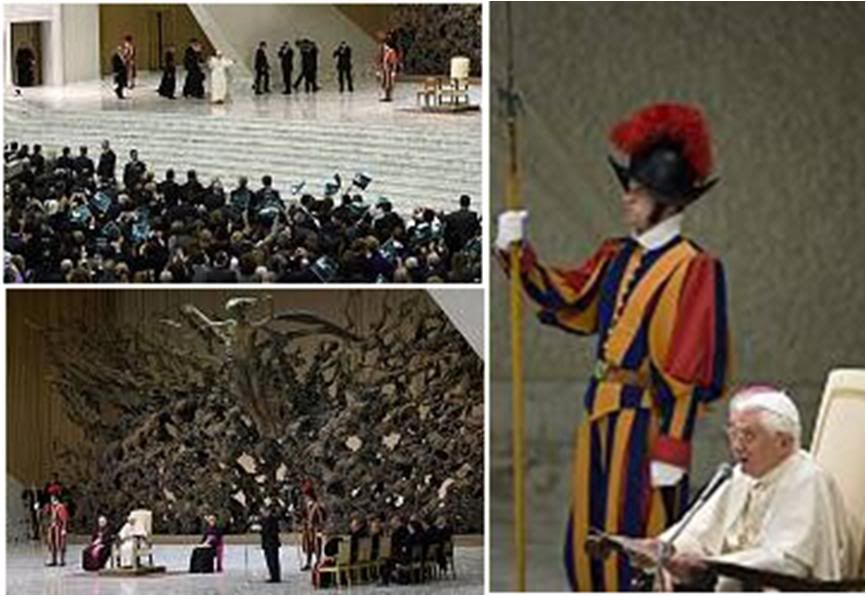 Here is a translation of the Holy Father's address
Here is a translation of the Holy Father's address:
Eminent Cardinals,
Mr. Senate President and distinguished officials,
Rector Magnificus and dear Professors,
Dear Missionaries 'della Scuola' [a congregation of teaching sisters],
Dear students and friends:
I am very happy to meet you on the occasion of the 70th anniversary of the founding of the Libera Università Maria Santissima Assunta.
I greet the rector of your university, Prof. Giuseppe Della Torre, and I thank him for his kind words.
It is my pleasure to greet the President of the Senate, the Hon. Renato Schifani, and the other Italian civilian and military authorities, as well as all the many personalities, rectors and administrative directors who are present.
To all of you who make up the great family of LUMSA, I extend my warm welcome.
Your university, which began in 1939 through the initiative of the Servant of God Mother Luigia Tincani, founder of the Unione Santa Caterina da Siena delle Missionarie della Scuola, and of Cardinal Giuseppe Pizzardo, who was then Prefect of the Congregation for Seminaries and Universities, was founded for the purpose of promoting an adequate university formation for religious sisters destined to teach in Catholic schools.
Your university was therefore born with a well-defined Catholic identity, also in conjunction with the intentions of the Holy See, with which it keeps a close connection.
In the past 70 years, LUMSA has prepared ranks of teachers, and has developed remarkably, especially after 1989, when it became a Free University, with the creation of new faculties and the widening of its student base.
I know that today it has some 9,000 students in its four locations in Italy and that it represents an important reference in the educational field.
As the cultural and legislative situation in Italy and Europe has been undergoing profound changes, LUMSA has continued its growth attentive to two things: to remain faithful to the original intuition of Mother Tincani and, at the same time, to respond to new challenges in society.
The context today is characterized by a worrisome educational emergency, on which I have dwelt on several occasions, to which the task of those who are called to teach has a very specific relevance.
Especially so with university professors, but also with the formative itinerary itself of those who are preparing to be teachers in the various academic levels, or professionals in other sectors of society.
In fact, every profession is an occasion to testify to and translate into practice the values that are personally internalized during the academic years.
The profound economic crisis throughout the world, and the causes of its origin, have shown the need for a more decisive and courageous investment in the field of knowledge and education as a way to respond to the numerous open challenges and to prepare the young generations to build a better feature (cfr Enc. Caritas in veritate, 30-31; 61).
Here then is where one notes the need to create in the educational field thought linkages, with collaboration among disciplines so they can learn from each other.
In the face of the great changes that are under way, it is therefore increasingly urgent to call on those fundamental values that must be transmitted as an indispensable patrimony to the new generations, and therefore to ask ourselves what these values are. Thus, academic institutions are faced with pressing questions of an ethical character.
In this context, Catholic universities are entrusted with a relevant role, one that is faithful to their specific identity and to the effort to render qualified service to the Church and to society.
In this sense, the indications offered by my venerated predecessor John Paul II in his Apostolic Constitution Ex corde ecclesiae are even more relevant, exhorting the Catholic university to institutionally guarantee the Christian presence in the academic world.
In the overall social and cultural reality, the Catholic university is called on to act with Christian inspiration both by individuals and by the university community as such; with incessant knowledgeable reflection, illuminated by faith, and scientific research; with fidelity to the Christian message as the Church presents it; and with institutional commitment to serving the people of God and the human family in their journey towards the final goal (cfr No, 13).
Dear friends, LUMSA is a Catholic university which has Christian inspiration as a specific element of its identity. As its Magna Carta says, it offers scientific work oriented to a search for the truth in the dialog between faith and reason, in an ideal tension towards the integration of knowledge and values.
At the same time, it envisions formative activities to be conducted with constant ethical attention, while elaborating positive syntheses between faith and culture, and between knowledge and wisdom, for the full and harmonious growth of the human being.
This imposition is for you, dear professors, stimulating and demanding. Indeed, as you work to be even more qualified for teaching and research, you must also cultivate the educational mission itself.
Today, as in the past, the University needs true teachers, who transmit, along with scientific facts and knowledge, a rigorous method of research, with profound values and motivations.
Immersed in a fragmented and relativistic society, you, dear students, must always keep your minds and hearts open to the truth. Dedicate yourselves to acquiring, in a profound way, all the knowledge that goes into the integral formation of your personality, to refine your capacity for searching out truth and goodness during your whole life, and to prepare you professionally to become builders of a more just and brotherly society.
May the example of Mother Tincani foment in everyone the commitment to accompany rigorous academic work with an intense interior life sustained by prayer.
May the Virgin Mary, Seat of Wisdom, guide your journey with the true wisdom that comes from God.
I thank you for this most welcome encounter, and from the heart, I bless each of you and your work.
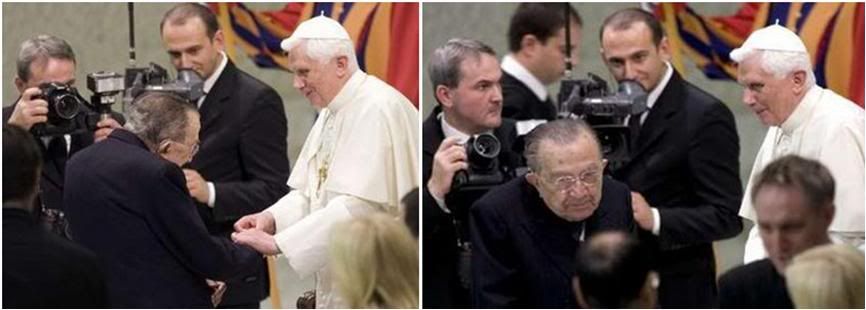 In the pictures above, the Pope greets Senator-for-life Giulio Andreotti, who is also publisher-editor of the magazine 30 GIORNI.
In the pictures above, the Pope greets Senator-for-life Giulio Andreotti, who is also publisher-editor of the magazine 30 GIORNI.
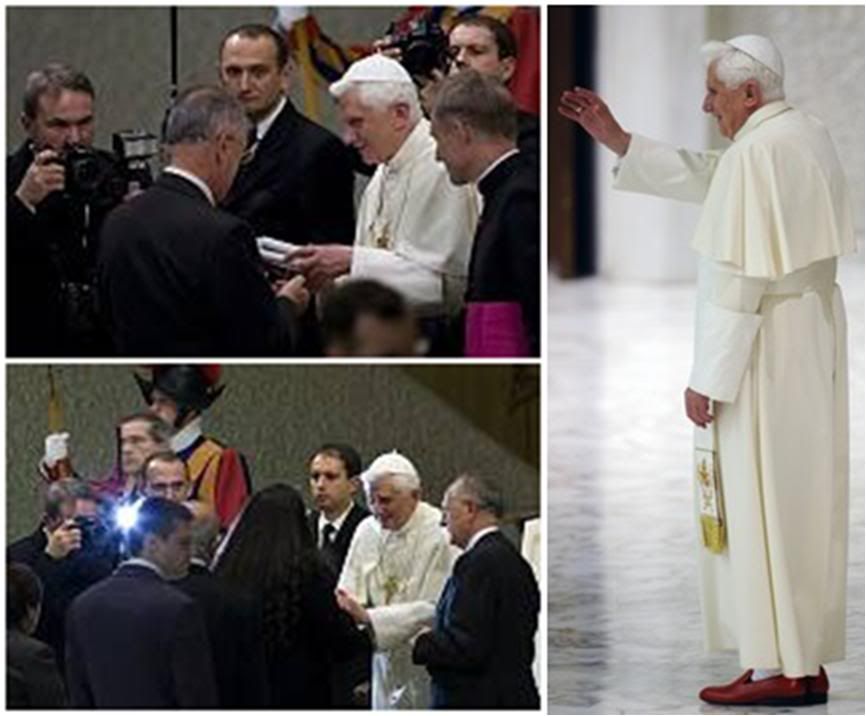
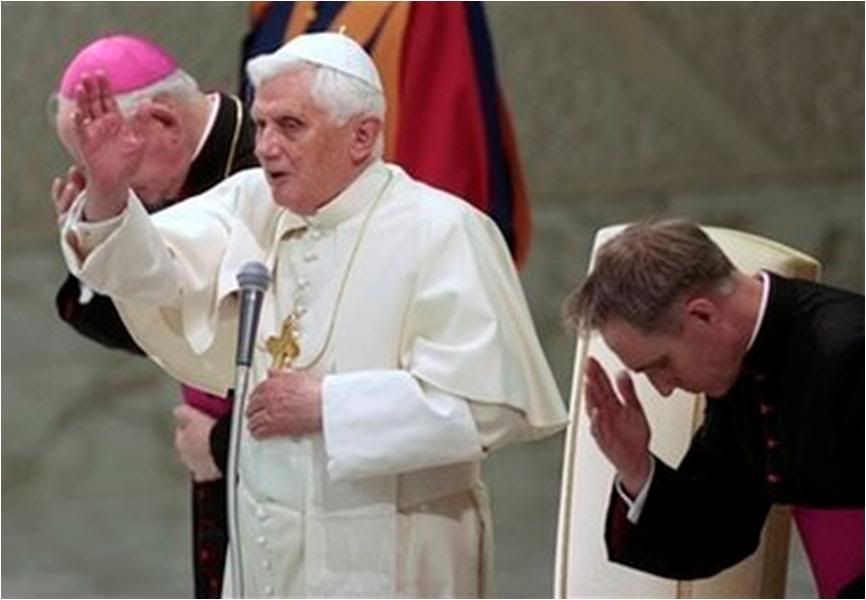
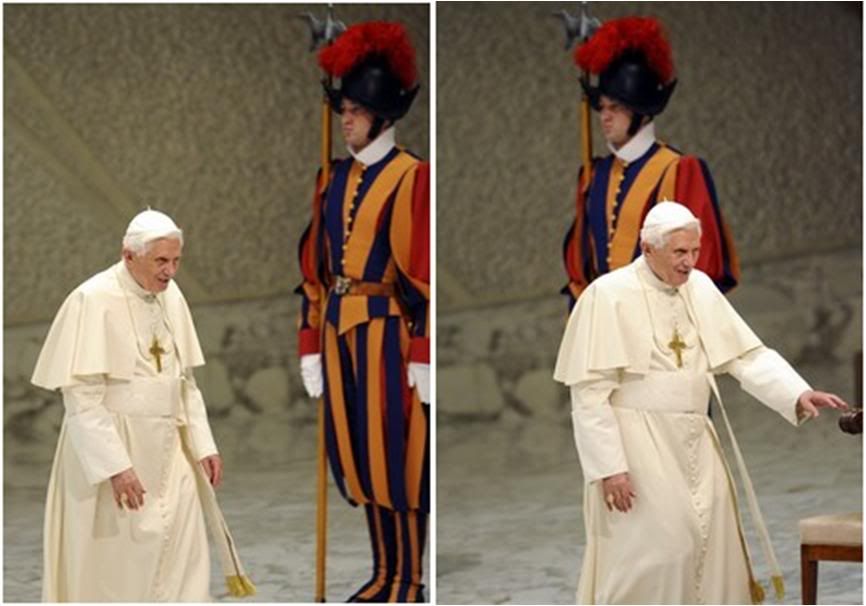
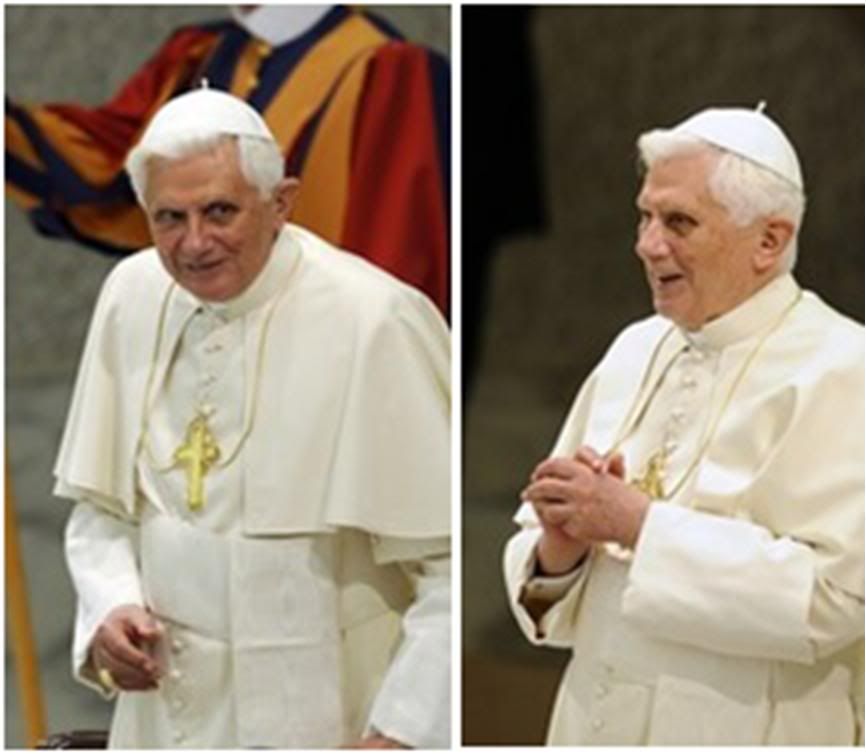
[Modificato da TERESA BENEDETTA 14/11/2009 05:16] |
| |
 13/11/2009 13:24 13/11/2009 13:24 |
|
| | | OFFLINE | | Post: 18.851
Post: 1.499 | Registrato il: 28/08/2005
Registrato il: 20/01/2009 | Administratore | Utente Veteran | |
|
 A stale secularism and
A stale secularism and
a contemporary Pope
Translated from

Nov. 12, 2009
A comparison between the work of Benedict XVI and the verdict of the Strasbourg court on the Crucifix ia a critical reference point for the current vulgate that secularism is the correct expression of the secularity and freedom of thought that liberated the West from confessionalism and the alleged mental closedness of the Church.
Indeed, the judgment reveals the serious disconnect between the dominant culture and the real life of people - and that is why protests against it have arisen from all sides like a wave of iressistible common sense.
Above all, it shows that the dominant culture, now reduced to taking offense at religious symbols in the name of principle, is no longer capable of responding to the challenges of the contempoary world.
This is a world in which the anti-clerical and libertarian battles seem to have exhausted their momentum, because although they have disseminated, as Benedict XVI noted last Sunday, "a mentality which leads to doubting the value of the person and the goodness of life", they have also created a situation in which "one forcefully notes a widespread thirst for certainties and values".
The verdict on the Crucifix, beyond being illogical, is outdated: while the secularists are still dedicated to removing every religious sign from public spaces, the world has far more demanding issues.
Papa Ratzinger, with his continuous invitations to widen the perspectives of reason and to be open to the spiritual dimension with confidence in the truth, knows this - and shows how Christianity is capable of grasping the aspirations of contemporary man.
[Modificato da TERESA BENEDETTA 13/11/2009 13:24] |
| |
 13/11/2009 14:28 13/11/2009 14:28 |
|
| | | OFFLINE | | Post: 18.852
Post: 1.500 | Registrato il: 28/08/2005
Registrato il: 20/01/2009 | Administratore | Utente Veteran | |
|
 Friday, Nov. 13
Friday, Nov. 13
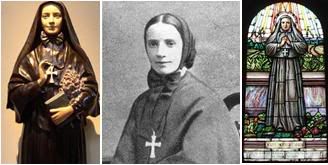 ST. FRANCES XAVIER CABRINI (b Italy 1850, d USA 1917)
ST. FRANCES XAVIER CABRINI (b Italy 1850, d USA 1917)
Missionary and Founder, Missionary Sisters of the Sacred Heart of Jesus
Patron Saint of Immigrants
Born to a modest family in Lombardy, she became a nun and soon rose
to be the Mother Superior of an orphanage in Codogno where she taught.
When the orphanage closed, she and seven of her colleagues set up
the Missionary Sisters order. Her work brought her to the attention
of Leo XIII who asked her to go the United States as a missionary
instead of China which she would have preferred. With Chicago as
her base, she and her order established dozens of schools, hospitals
and orphanages for poor people, as well as assistance and adult
education for Italian immigrants. In 1946, she became the first US
citizen to be canonized.
OR today.

The Pope to professors and students of Rome's LUMSA university:
'A decisive and courageous investment in knowledge and education'
Other Page 1 stories: The Holy Father's audience with the President of Croatia; an essay by the FAO director-general on world hunger anticipates the world summit on food security next week in Rome, to be opened by the Pope; the International Red Cross reports on millions of refugees who are not getting any aid; President Obama tells Afghan President Karzai that the US will not stay in Afghanistan 'forever'; and Israel PM Netanyahu opens a dialog with Syria.
THE POPE'S DAY
The Holy Father met today with
- H.E. Gordon Bajnai, Prime Minister of the Republic of Hungary and his delegation
- Bishops of Brazil (South Sector-1, Group 4) on ad limina visit
- Members of the full Pontifical Council Cor Unum. Address in Italian.
- Cardinal William Joseph Levada, Prefect of the Congregation for the Doctrine of the Faith.
[Modificato da TERESA BENEDETTA 14/11/2009 02:12] |
| |
 13/11/2009 14:55 13/11/2009 14:55 |
|
| | | OFFLINE | | Post: 18.853
Post: 1.501 | Registrato il: 28/08/2005
Registrato il: 20/01/2009 | Administratore | Utente Veteran | |
|

 I generally ignore the standard anti-Pope, anti-Rome rantings of the known 'liberal Catholic' mouthpieces like the National Catholic Reporter and America in the USA, and The Tablet in the UK, leaving it to other commentators to point out their most egregious fits of perversion and just plain wrong thinking. Damian Thompson does that now...
The Tablet launches bitter
I generally ignore the standard anti-Pope, anti-Rome rantings of the known 'liberal Catholic' mouthpieces like the National Catholic Reporter and America in the USA, and The Tablet in the UK, leaving it to other commentators to point out their most egregious fits of perversion and just plain wrong thinking. Damian Thompson does that now...
The Tablet launches bitter
and ignorant attack on the Pope's
Apostolic Constitution

Nov. 13, 2009
The Tablet’s editorial this week is a wretched attack on the Pope’s Apostolic Constitution, arguing that the Congregation for the Doctrine of the Faith (read: the Pope) doesn’t understand Anglo-Catholicism.
The article is a bitter and partisan piece of work, reflecting the wounded pride of English bishops who were not consulted about the Apostolic Constitution for the very good reason that they would have tried to sabotage it. The editorial says:
"Perhaps because of lack of consultation with both Catholic and Anglican authorities in England, the CDF seems to have failed to grasp what Anglo-Catholicism is really all about".
What about the CDF’s years of consultation with the bishops who lead the Anglo-Catholic conservatives in England? Do you think that Bishops John Broadhurst and Andrew Burnham failed to communicate what Anglo-Catholicism is “really all about”? The Tablet continues:
[Anglo-Catholicism's] fundamental aim was to reassert the Catholic credentials of the Church of England as the “ancient Catholic Church of these lands” identical in essence to the medieval English Church.
It is from this foundation that derive all those characteristics of its style that the CDF is keen to preserve – the interiors of its churches almost indistinguishable from Catholic churches, the use of “Father” as the title for its clergy, and devotion to a Catholic type of spirituality including honouring the Virgin Mary.
But unless one counts use of the Roman missal in some of their churches, there is no distinctive Anglo-Catholic liturgy.
Anglo-Catholicism is going through a profound crisis precisely because it is losing faith in its central principle.
Anglicanorum coetibus is offering to let incoming Anglo-Catholics hang on to the incidental symbols of that principle, while relinquishing what lies behind it. Does that make sense?
Well, no, it doesn’t make sense – if you accept the Tablet’s ignorant account of Anglo-Catholicism, a phenomenon it has never remotely understood.
There isn’t space to go into detail here, but the Anglo-Papal strand within the movement was not chiefly interested in recreating medieval English Catholicism (as some other Anglo-Catholics were) and made sure that its liturgy reflected post-Reformation (and post-Vatican II) developments in Roman Catholicism.
Then we get the old argument that, because English Anglo-Catholics use the Roman liturgy, they would be just “hanging on to incidentals”, even that “there is no distinctive Anglo-Catholic liturgy”.
Can you imagine the Bitter Pill – and it really is bitter this week – insulting any other religious tradition in this fashion? The distinctiveness of the English Anglo-Catholic liturgy arises partly from its ethos, which reflects a solemnity that has been lost by so many Roman Catholic parishes in this country.
There is nothing “incidental” about this ethos. In Anglo-Catholicism at its best you find a way of celebrating ancient feasts in an English manner that draws authentically on the medieval Church: it is one of the “treasures” that the Holy Father wishes to see reincorporated into Catholicism.
And it is he, not the CDF, who is the author of the Apostolic Constitution Anglicanorum Coetibus. So let us be very clear about this. The Tablet is attacking the Pope, rubbishing a project that is very dear to his heart and central to his ecumenical mission.
The magazine also contains a sour, biased analysis of the Constitution by ex-priest Nicholas Lash, criticising it for the way it cites The Catechism of The Catholic Church – “a useful if uneven compendium of Catholic teaching. It has little or no authority in itself…” [Excuse me???? Since it is derived from specific magisterial acts (each referrence duly noted in the Catechism), it is part of the Magisterium, so how can it not have any authority???? Lash is not just sour and biased, he too is showing his ignorance. We must be thankful he is an ex-priest!]
And yet still The Tablet has the nerve to call itself Catholic. [Just as Notre Dame and NCReporter and America and countless others we can name still do - because in fact they claim to 'be the Church' ['We are Church'!], as though the faithful alone make up the Church and there is no structure and leadership that have guided her and kept her together for 2000 years!]
I liked the following commentary by the missionary priest Fr. Scalese whose views I generall find congenial:
On 'Anglicanorum coetibus'
Translated from

Nov. 10, 2009
I have read the Apostolic Constitution Anglicanorum coetibus with the Complementary Norms issued by the Congregation for the Doctrine of the Faith. We knew beforehand the main lines of these documents, so there were no great surprises. But one cannot remain indifferent when reading the official texts,
My first feeling was of amazement at how the Catholic Church has known from time to time how to adapt itself to various situations. This new juridical institution of 'personal ordinariates' is not provided for in the Code of Canon Law. There already exist the 'military ordinariates' - not in the Code of Canon Law, either, but also created through Apostolic Constitution - but this model had not been previously applied to any other type of congregation.
But a new situation had presented itself: Groups of Anglican faithful, with their pastors, had asked to be received 'corporatively' into the Catholic Church. And what does tehChurch do? It creates a new personal church circumscription especially for them, in order to respond to their request and their legitimate aspirations.
The only condition asked of them is this: "Do you accept the Catechism of the Catholic Church?" Nothing more.
Once the same faith is shared, everything is possible, and a solution can be found to any problem.
Do you wish to continue following your own traditions? Not a problem!
Do your married priests wish to continue being priests? OK. They must be re-ordained as Catholic priests but they can stay married.
Do your bishops want to continue being your pastors? It is possible. If they are unmarried, they can be reordained bishops and become 'ordinaries' [bishop]. If they are married, they can be re-ordained as priests, and they may continue to use their episcopal insignia on request and be part of bishops' conferences as emeritus bishops.
I told myself, this leaves little to the imagination! And all this, coming from the Catholic Church, which is usually perceived as conservative, traditionalist, and slow to adapt to changes.
But in this case, the conservatives seem to be the Anglican Church itself. Listen to Bishop John Broadhurst, of the 'Forward in Faith' federation of traditional Anglican churches: “I have been horrified that the Church of England, while trying to accommodate us, has consistently said we cannot have the jurisdiction and independent life that most of us feel we need to continue on our Christian pilgrimage. What Rome has done is offer exactly what the Church of England has refused.”
Did you hear that? These Anglicans, who do not accept the novelties itnroduced into their church, before turning to the Catholic Church, first asked the Church of England itself for legitimate autonomy [no room for them in a church where, moreover, there has always been room for the most diverse positions, even contradictory at times].
No, they were told, "Put up or do what you will!" What the liberal Church of England could not give to them has been granted by the backward Catholic Church!
This is a sign of the Church's great vitality. Those 'churches' that cnsider themselves 'open' and modern simply because they allow women priests and practising homosexuals as bishops or sanction same-sex marriage, are actually 'dead' churches.
We must wait and see what happens next, but if enough Anglican groups decide to join the Catholic church, then thexAnglican Communion risks being reduced to an aggrupation of nostalgic practitioners.
Of course, we cannot ignore the difficulties that await the Catholic Church itself. Not eveything will be easy. Just reading the Apostolic Constitution and its complementary norms, one can see a certain inevitable confusion which will result when the new ordinariates are superimposed on existing dioceses.
There are also situations which will not be easy to normalize, like priests who are in irregular matrimonial situations, as well as the Catholic priests who had converted to Anglicanism in order be able to get married. [The norms make it slear they cannot be readmitted as priests into the Catholic Church, which makes sense, I think, in terms of principle.]
We can also add the difficulties that priests and communities will have with their Anglican parishes, especially in practicale conomic terms.
And we must not forget that although the converting Anglicans may consider themselves 'traditionalists', they also come from ultra-liberal surroundings and may carry a certain mentality that finds itself at war with Catholic practices. [I think if the convering Anglicans are traditionalist enough to oppose women priests, gay priests and same-sex marriages, then they would be unlikely to advocate abortion, euthanasia, and artificial reproduction which are more 'fundamental' to the faith.]
These are real difficulties which we cannot hide but which should not hinder us - they are difficulties characteristic of the living reality.
Meanwhile, let us enjoy this moment of grace. Let us thank the Lord who shows us, even through this episode, that the Catholic Church - that Church considered by many as broken apart and often critivized by we ourselves for her limitations and her errors) is the true Church of which - unworthily but with great pride - we are part.
[Modificato da TERESA BENEDETTA 15/11/2009 22:25] |
| |
 13/11/2009 16:58 13/11/2009 16:58 |
|
| | | OFFLINE | | Post: 18.856
Post: 1.504 | Registrato il: 28/08/2005
Registrato il: 20/01/2009 | Administratore | Utente Veteran | |
|

 For the record, the latest swing in Moscow's apparently deliberate 'blow-hot-blow-cold' tactics in dealing with the prospects of a meeting between Pope Benedict XVI and the Patriarch of Moscow. This has been going on since Benedict became Pope, and it's tiresome already....
For the record, the latest swing in Moscow's apparently deliberate 'blow-hot-blow-cold' tactics in dealing with the prospects of a meeting between Pope Benedict XVI and the Patriarch of Moscow. This has been going on since Benedict became Pope, and it's tiresome already....
The source this time is the same Archbishop Hilarion who, in Cyprus, last month, said very bluntly, "It's not going to happen...Too many practical problems. Starting with the Ukrainians who decided to recognize the primacy of the Pope", or words to that effect.
They have made it clear, in every way they can, that this is simply not a priority for them.
Hilarion says meeting between Pope
and Patriarch Kirill 'on the cards'

Moscow, November 12 (Interfax) - Relations between the Russian Orthodox and Roman Catholic Churches are improving and a meeting between Pope Benedict XVI and the Patriarch Kirill of Moscow and All Russia, may be on the cards, a Russian Orthodox bishop said.
"Today it can be said that we are moving to a moment when it becomes possible to prepare a meeting between the Pope and the Patriarch of Moscow," Archbishop Hilarion of Volokolamsk, the head of the Department for External Church Relations, told reporters in Moscow.
"There are no specific plans for the venue or timing of such a meeting but on both sides there is a desire to prepare it," the Archbishop said.
Preparations for such a meeting must involve finding "a common platform on all remaining points of dispute," the Archbishop said.
One such issue are relations between the Uniate community and Orthodox believers in Ukraine. In the early 1990s, "the fragile interdenominational balance was upset and a serious situation took shape that still exists," Archbishop Hilarion said.
At the same time, conversion of Orthodox believers into Catholicism is less of a problem today than it was a decade ago, he said.
Benedict XVI is "a very reserved, traditional man who does not seek the expansion of the Catholic Church to traditionally Orthodox regions," the Archbishop said.
When Benedict XVI, shortly after being elected Pope, met with Metropolitan Kirill (the present Russian Patriarch, then head of the DECR, a papal visit to Russia "was taken off the agenda as now it appears to us to be impossible," the bishop said.
After Metropolitan Kirill has been elected Patriarch, "one can hope for further steps" in Orthodox-Catholic dialogue because the Patriarch "will continue the line on relations with Christians of other denominations that he pursued as part of his former activities," the Archbishop said.
I deduce from the Telegraph's treatment of this story - which lifts the Interfax report, without acknowledging the source and then interprets it so extravagantly - that the journalist who put it together has not been following Moscow's yo-yo play in the past four years, and particularly Archbishop Hilarion's since he was named to his present post, which is virtually #2 in the Patriarchate (the very same post occupied by Patriarch Kyrill before he succeeded the late Alexei II).
The Telegraph headline is almost downright laughable, and the lead sentence is clearly false! Moscow has always been clear it will not even begin to discuss a meeting until its moveable/mutable list of conditions are first met!
Russian Orthodox and Catholic Church
may end 950-year rift
By Rachel Cooper

Nov. 13, 2009
Talks have been held to discuss a meeting between Pope Benedict XVI and the patriarch of the Russian Orthodox Church.
Relations between the Vatican and the Russian Orthodox Church have been tense for centuries, but in a sign that relations are finally thawing, Archbishop Ilarion, who heads the Russian Orthodox Church’s foreign relations department, said that both sides wanted a meeting, although he emphasised that problems remained.
[Of course, both sides have always said they 'want a meeting', and Rome has been serious about this, even under John Paul II whom the Russians treated shabbily, almost insultingly, in this respect! But it's not a priority for the Russians, who cannot stand their 'third Rome' status, for all that it is historic reality, and would much rather go on being big fish in the Orthodox pond which they easily dominate in numbers, than be a minnow in the Catholic ocean as they would necessarily be in a reunified Church!]
Ilarion spoke of a rapprochement under Pope Benedict XVI that would allow for a meeting with the new Russian Orthodox Patriarch, Kiril, who took up his office in February after the death of the previous patriarch.
“There have been visits at a high level,” said Illarion. “We are moving towards the moment when it will become possible to prepare a meeting between the Pope and the Moscow patriarch.”
He added that in recent years there had been “noticeable improvements” in relations between the two churches.
“The progress in relations between the Russian Orthodox Church and the Catholic Church began after Benedict XVI became pope. He is…a person who does not aim to grow the Catholic Church in traditional Orthodox regions.”
Some observers had hinted a meeting between the two Church leaders was forthcoming, but many issues still stand in the way of bridging the split, which dates from 1054 when Patriarch of Constantinople was excommunicated from the Catholic Church.
The breach heralded the Great Schism that finally divided the Christian churches of East and West – which had long had political and theological differences, including the wording of the Nicene Creed – and led to the creation of the Eastern Orthodox Church and the Roman Catholic Church.
Relations have been tense ever since, and were strained again in recent years by Orthodox accusations of Catholics proselytising in Russia - although historians have cast doubt on such claims.
Mark Nash of the Agency for Evangelisation, who has studied the relationship between the Russian Orthodox and Catholic Church, said a "a lot of the instances of 'proselytising' were in orphanages and children's programmes.
"The chancellor of the Russian Bishops' Conference, Father Igor Kovalevsky, who was on the joint committee tasked with investigating the allegations, said they were 'misunderstandings'."
Dr Jeremy Smith, senior lecturer in Russian history at the University of Birmingham, added that his impression was that the Catholic Church "had not really engaged in proselytising".
"Consequently, [the Catholic church] has remained on relatively good terms with the Orthodox clergy, especially at a local level," he said.
He added that the Russian authorities aimed anti-proselytising laws "more strongly against organisations like the Moonies".
Such legislation, he added, marked an attempt by the government to establish the Russian Orthodox Church as "a centrepiece of Russian identity, albeit as a pillar of the state, after the fall of Communism".
[Modificato da TERESA BENEDETTA 09/01/2010 03:47] |
| |
 13/11/2009 22:46 13/11/2009 22:46 |
|
| | | OFFLINE | | Post: 18.858
Post: 1.506 | Registrato il: 28/08/2005
Registrato il: 20/01/2009 | Administratore | Utente Veteran | |
|


 Portugal trip shapes up
Portugal trip shapes up
as a 4-day event May 11-14
to Lisbon, Fatima and Oporto
Translated from
 News agency of the Portuguese Bishops' Conference
News agency of the Portuguese Bishops' Conference
The proposed program for Pope Benedict XVI's trip to Portugal next year is now in his hands for approval, with a May 11-14 itinerary that will cover Lisbon, Fatima and Oporto.
This was disclosed by the Portuguese bishops' conference (CEP) which said that the Pope would definitely arrive in Lisbon on May 11 and depart back for Rome on May 14.
Mons. Jose Ortiga, president of the CEP and Archbishop of Braga said that the bishops have sent the Pope a proposed program with 'a choice of various initiatives'.
Dom Ortiga said there will be liturgical celebrations and meetings in various places, to include meetings with the world of culture, of social-charitable work, and with priests and pastoral workers.
In Fatima, where the Pope is expected to be on May 13, the anniversary of the 1917 Marian apparitions, he said that the Pope's program would follow the 'usual schedule' of the annual celebration.
He said that Mons. Manuel Clemente, Bishop of Oporto, had formally requested the Holy Father to 'allow some room' on his program for a visit to Oporto.
He also said that the 'civilian' part of the program, which would include official meetings with the President of Portugal and other government leaders, still has to be defined.
In their final statement following their plenary assembly this week, the Portuguese bishops expressed their joy at the coming papal visit. and called on the faithful for "a renewal of faith and of bearing witness to justice and charity at a time when so many of our brothers and sisters are undergoing great difficulties".
They expressed the hope that the visit would "not be a fleeting event" but that initiatives in preparations for the visit should look to a continuation after it "to concretize the messages that the Pope will give us".
The bishops have named the Auxiliary Bishop of Lisbon, Mons. Carlos Azevedo, as general coordinator for the papal visit. The liturgical director for the Diocese of Leiria-Fatima, Fr. Carlos Cabecinhas, will be in charge of liturgies, and communications will be under the direction of Fr. Manuel Morujao, secretary and spokesman of the CEP.
[Modificato da TERESA BENEDETTA 14/11/2009 13:33] |
| |
 13/11/2009 23:53 13/11/2009 23:53 |
|
| | | OFFLINE | | Post: 18.859
Post: 1.507 | Registrato il: 28/08/2005
Registrato il: 20/01/2009 | Administratore | Utente Veteran | |
|
 WITH THE PRIME MINISTER OF HUNGARY
WITH THE PRIME MINISTER OF HUNGARY

Nov. 13, 2009
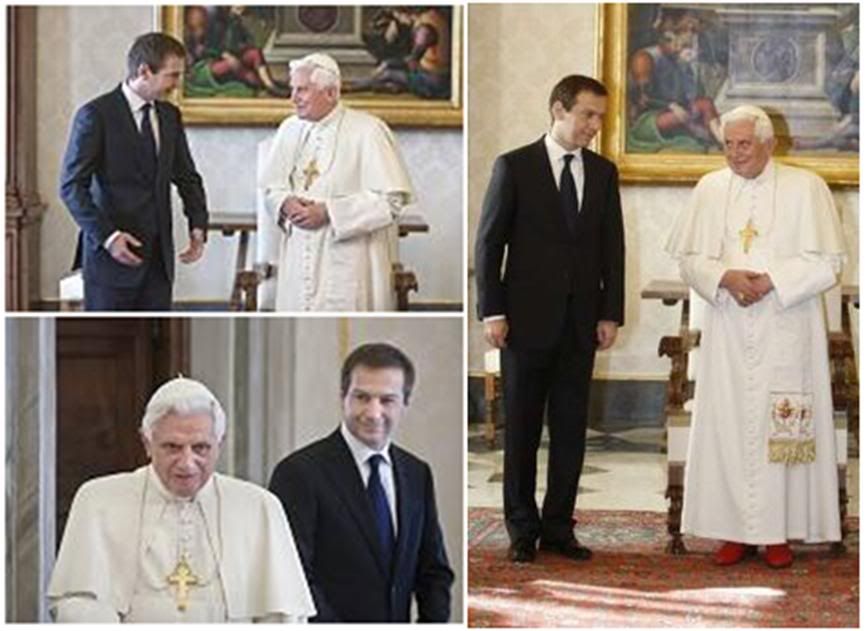
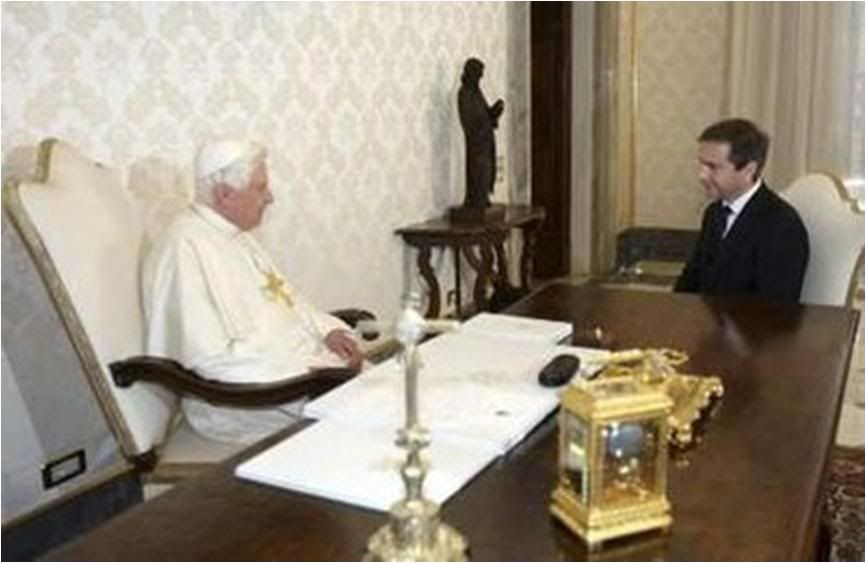
This morning the Holy Father received in audience Gordon Bajnai, Prime Minister of the Republic of Hungary.
The Prime Minister subsequently went on to meet with Cardinal Secretary of State Tarcisio Bertone S.D.B. who was accompanied by Archbishop Dominique Mamberti, secretary for Relations with States.
In the course of the cordial discussions - having recalled how the bilateral agreements signed over recent years have ratified reciprocal relations - attention turned to certain questions concerning the rapport between the ecclesial and civil communities, and the importance was underlined of continuing dialogue through the appropriate bodies.
An exchange of opinions also took place on the current international situation, including the financial crisis in the light of Caritas in veritate, and mention was made of the Hungarian presidency of the European Union, due for the first six months of 2011.
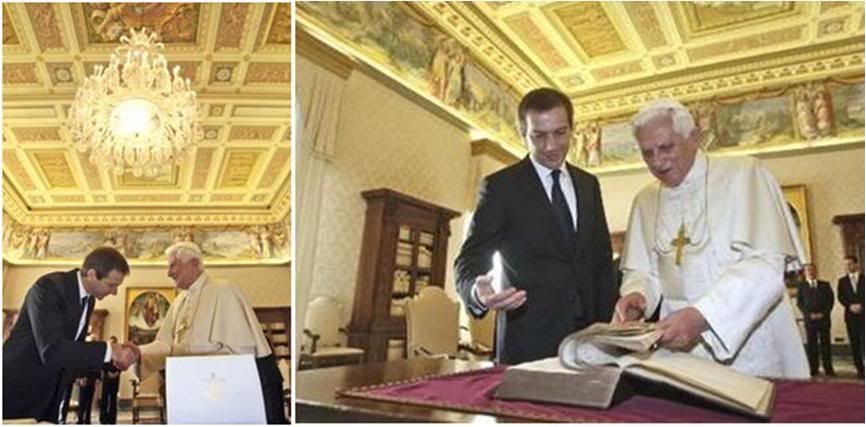
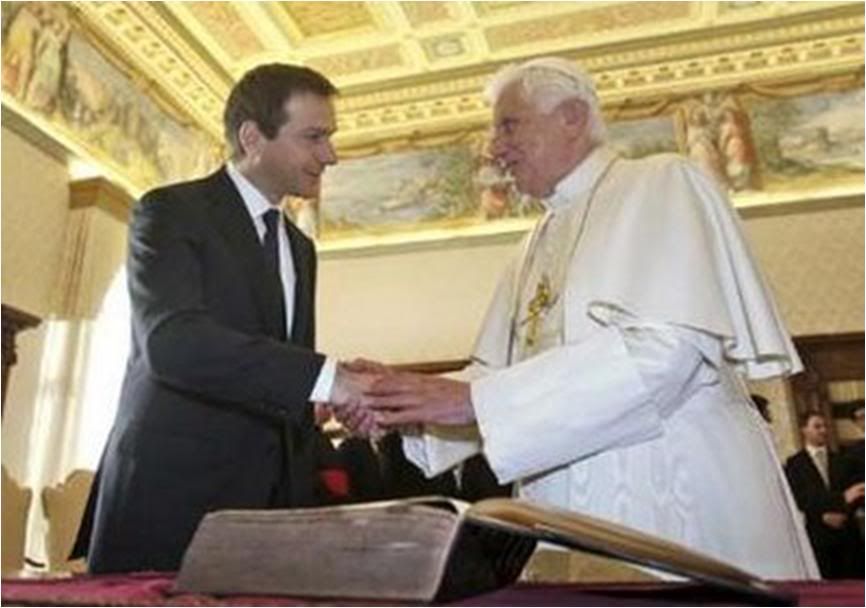
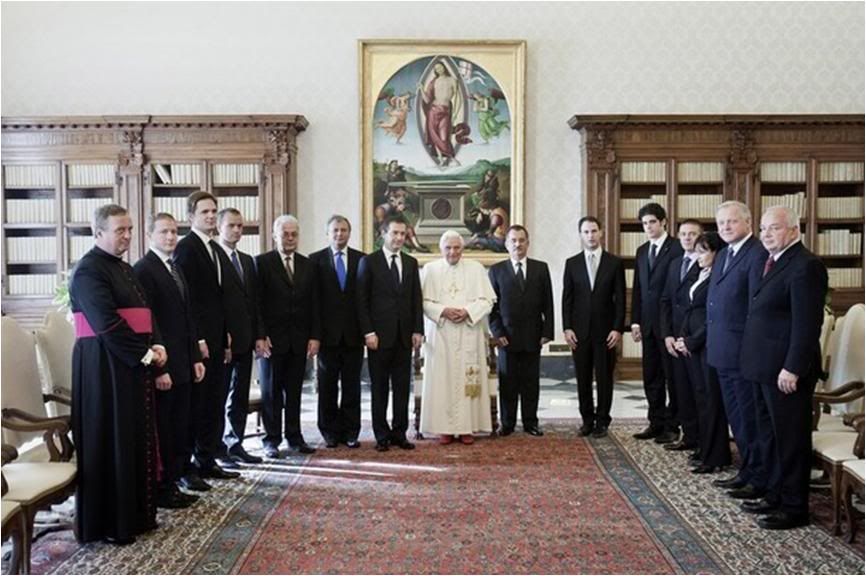 [Modificato da TERESA BENEDETTA 14/11/2009 04:50] |
| |
 14/11/2009 00:35 14/11/2009 00:35 |
|
| | | OFFLINE | | Post: 18.860
Post: 1.508 | Registrato il: 28/08/2005
Registrato il: 20/01/2009 | Administratore | Utente Veteran | |
|

 'COR UNUM':
'COR UNUM':
ANNOUNCING THE GOSPEL
AND SERVING MANKIND

Nov. 13, 2009
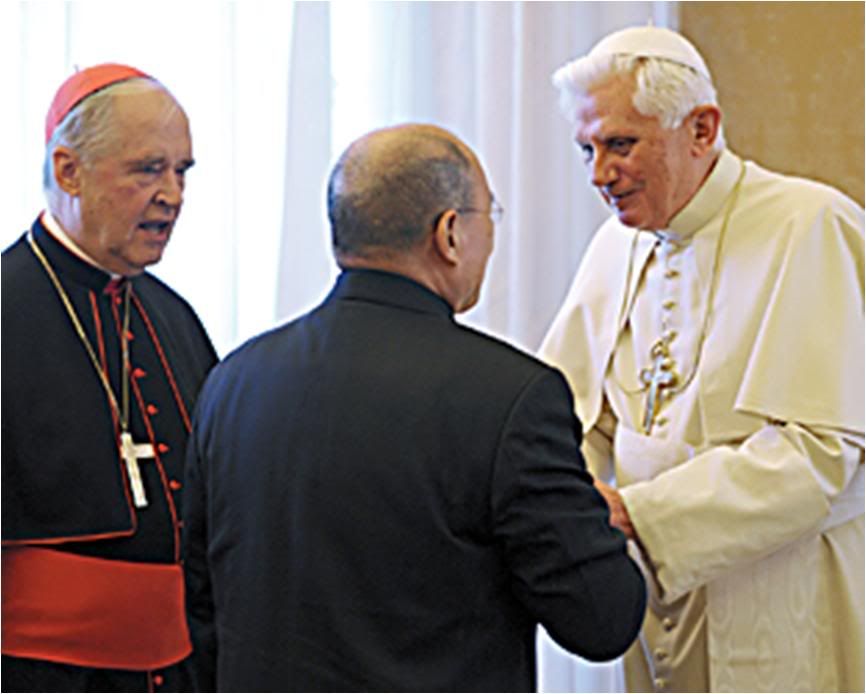
VATICAN CITY, 13 NOV 2009 (VIS) - Participants in the plenary assembly of the Pontifical Council "Cor Unum", with their President, Cardinal Paul Josef Cordes, were received in audience this morning by the Holy Father, who thanked them for their "valuable service to the charitable activities of the Church".
In his address the Pope explained how the mission of Cor Unum involves "a constant tension between two poles: announcement of the Gospel and concern for the heart of man in the environments in which he lives".
He recalled how this year two ecclesial events had highlighted these aspects, "the publication of the Encyclical Caritas in vritate, and the celebration of the Special Assembly for Africa of the Synod of Bishops on reconciliation, justice and peace.
"From different but converging points of view, these events underlined how the Church, in her announcement of salvation, cannot overlook the real living conditions of the human beings to whom she has been sent", the Holy Father added.
"It was precisely through such an awareness that, over the centuries, many ecclesial structures and activities came into being with the aim of promoting individuals and peoples. They have made, and continue to make, an irreplaceable contribution to the growth and the harmonious and integral development of human beings".
"It is in this light that we must consider the Church's commitment to the development of a more just society, one in which the rights of individuals and peoples are recognised and respected. ... It is certainly not the Church's task to intervene directly in the political life of States, but the Christian community cannot and must not remain at the margins when it comes to defending human rights and promoting justice".
Benedict XVI went on:
"Faith is a spiritual force that purifies reason in the search for a just [social] order, freeing it from the ever-present risk of being 'blinded' by egoism, by interest and by power. The truth is, as experience shows even in the most socially developed societies, that caritas remains necessary.
"The service of love is never superfluous because situations of suffering, solitude and need still persist, which require dedicated people and tangible aid.
"Thus, anyone who serves within the ecclesial organisations that concern themselves with charitable initiatives and works cannot but have this main objective: bringing people to know and experience the merciful Face of the heavenly Father, because in the heart of God-Love is the true answer to the most intimate hopes of every human heart".
"It is important that the Church, inserted into the events of history and of the life of man", the Pope concluded, "become a channel for the goodness and love of God".
[Modificato da TERESA BENEDETTA 14/11/2009 02:05] |
| |
 14/11/2009 14:39 14/11/2009 14:39 |
|
| | | OFFLINE | | Post: 18.861
Post: 1.509 | Registrato il: 28/08/2005
Registrato il: 20/01/2009 | Administratore | Utente Veteran | |
|
 Saturday, Nov. 14
Saturday, Nov. 14
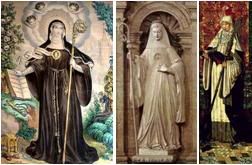 ST. GERTRUDE OF HELFTA (Germany, 1256-1302)
ST. GERTRUDE OF HELFTA (Germany, 1256-1302)
Benedictine nun, Mystic and Writer
As a nun, she dedicated herself to the study
of philosophy and literature before she developed
a spiritual life that led to mystical visions.
Best known for prayers interceding for the souls
in purgatory.
OR today.

Speaking to the Pontifical Council Cor Unum, the Pope says
charity is never superfluous even in the most evolved societies:
The power of the Christian message for human rights and justice
The other papal story on Page 1 is the audience for the Prime Minister of Hungary (center photo). International stories: Obama's trip to Asia
as the new global center of gravity; African Union discussions to resolve water distribution problems on the continent; and new tensions between
the two Koreas.
THE POPE'S DAY
The Holy Father met today with
- H.E. Boris Tadić, President of the Republic of Serbia, and delegation
- Bishops of Brazil (South Sector-1) on ad limina visit, addressing them altogether after meeting them
in three separate groups earlier in the week. Address in Portuguese.
- H.E. Jan Fischer, Prime Minister of the Czech Republic, his wife and delegation.
[Modificato da TERESA BENEDETTA 14/11/2009 16:33] |
| |
 14/11/2009 15:18 14/11/2009 15:18 |
|
| | | OFFLINE | | Post: 18.862
Post: 1.510 | Registrato il: 28/08/2005
Registrato il: 20/01/2009 | Administratore | Utente Veteran | |
|

 MALTA BISHOPS ANNOUNCE
MALTA BISHOPS ANNOUNCE
APRIL 17-18 DATES
FOR PAPAL VISIT NEXT YEAR


Pope Benedict XVI will visit Malta on Saturday 17th and Sunday 18th April 2010, on the occasion of the 1950th anniversary of St Paul’s shipwreck.
The Pope will arrive in Malta on Saturday afternoon and return to Rome Sunday evening. On arrival, His Holiness will hold meetings with the highest Civil Authorities and then visit St. Paul’s Grotto in Rabat.
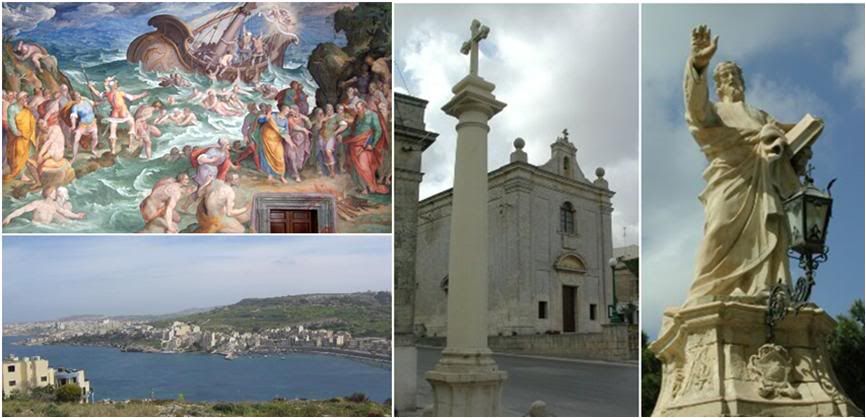
On Sunday morning the Pope will celebrate Mass on the Granaries, in Floriana and he will then meet youths at the Valletta Waterfront in the afternoon.
The possibility of Pope Benedict’s visit was announced on September 12th when it was communicated that His Holiness might visit Malta in April next year. The Bishops of Malta and the President of the Republic had previously invited His Holiness to visit Malta.
Further details of the Pope’s visit will be announced in due course.
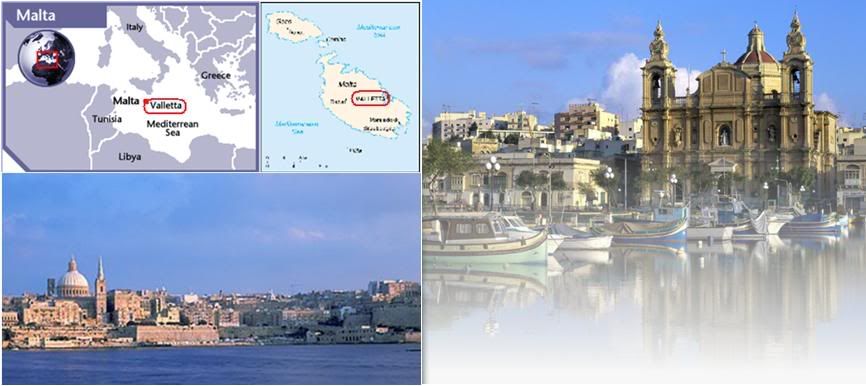
 CYPRUS DATE PENDING
CYPRUS DATE PENDING
With the announcement by the Portuguese bishops yesterday that the Holy Father's visit to Portugal will take place May 11-14, 2010, the date still has to be announced for the third papal trip abroad in 2010 known so far - Cyprus.
The announcement of the trip made Oct. 1 mentioned a probable June date. Cyprus is part of the Jerusalem diocese, and the Custody of the Holy Land is responsible for the pastoral care of three cities (Larnaca, Limassol, Nicosia) as well as several chapels there.


[Modificato da TERESA BENEDETTA 14/11/2009 16:22] |
| |
 14/11/2009 17:34 14/11/2009 17:34 |
|
| | | OFFLINE | | Post: 18.863
Post: 1.511 | Registrato il: 28/08/2005
Registrato il: 20/01/2009 | Administratore | Utente Veteran | |
|


 A birthday/anniversary/Easter gift for the Pope of Christian unity?
Primate hopes all TAC synods
A birthday/anniversary/Easter gift for the Pope of Christian unity?
Primate hopes all TAC synods
will approve joining Church by Easter
By Deborah Gyapong

P11/13/2009
OTAWA, Australia (CNS) -- The primate of the Traditional Anglican Communion said he hopes churches take action to enter into full communion with the Catholic Church before Easter.
Archbishop John Hepworth said he reacted "with overwhelming joy" to the apostolic constitution published Nov. 9 establishing the structure for Anglicans to be in full communion with the Catholic Church.
The archbishop described the constitution as "generous at every turn" in its description of the Anglican heritage, its dogmatic provisions and its pastoral language.
"We've been asked to show the rich heritage to the whole church, not just to ourselves," he said in an interview from Australia.
The Traditional Anglican Communion (TAC) includes Anglican churches that have left the much larger Anglican Communion over the ordination of women and sexually active homosexuals as priests.
TAC is among the largest group of Anglicans likely to embrace the Vatican's action to welcome them into full communion with the Church.
Archbishop Hepworth expects a positive response from Traditional Anglican Communion member churches around the world. Already, the United Kingdom's Traditional Anglican Communion synod voted to accept the document prior to its publication.
He said he has heard from churches around the world, describing their comments as "powerful messages that 'we want it and we want it as soon as we can get it.'"
Archbishop Hepworth has delivered a timetable to Traditional Anglican Communion bishops involving a series of regional and national synods starting early in 2010.
"I want all the votes in by Lent," Archbishop Hepworth said. "Then I'm hoping in fact our bishops can meet in Rome after Easter and present the 'yes' votes and take advice on what to do next."
While Archbishop Hepworth wants to move fast, he said the structure outlined in the apostolic constitution does not require anyone to rush headlong into it. "There's no deadline; it's available way into the future," he said.
"If (the Pope) deals with other groups as creatively and as warmly and pastorally as he has dealt with us, he is the Pope of (Christian) unity," Archbishop Hepworth said.
The primate described the personal ordinariate structure established in the apostolic constitution -- which offers the jurisdiction of a diocese without being tied to a geographical area -- as "radical."
"It's a modern church structure that the rest of the Church in fact will have to consider," he said. It also paves the way for other groups to come into communion corporately.
The two issues likely to draw the most media attention in the document are the provisions for married priests and for married bishops to potentially serve in the new structure.
The norm is clerical celibacy, he said, but there is a provision for married men to be ordained on a case-by-case basis approved by the Holy See, Archbishop Hepworth said.
"It will be done according to the norms developed by the ordinariate and the bishops' conferences and submitted to the Holy See for approval," he said.
"Without married priesthood into the future, it would be very difficult at this stage to sustain the Anglican ordinariate into the future," he added. " We Anglicans going into communion with the Holy See are going to have to deepen our understanding of the celibate priesthood."
 Here is an excellent report on Anglicanorum coetibus in this weeks issue of the UK's Catholic Herald. It includes several reactions not previously reported:
Rome opens arms to world's Anglicans
Here is an excellent report on Anglicanorum coetibus in this weeks issue of the UK's Catholic Herald. It includes several reactions not previously reported:
Rome opens arms to world's Anglicans
by Anna Arco

13 November 2009
The Vatican has released an eagerly awaited document outlining the Pope's provision for Anglican groups wishing to enter into full communion with Rome.
The Apostolic Constitution Anglicanorum coetibus ("On groups of Anglicans") was published on Monday, two weeks after the Vatican announced a new provision for Anglican communities that wish to become Catholic while retaining aspects of their Anglican identity.
The document, which introduces a new legal structure called a Personal Ordinariate, was accompanied by a set of complementary norms, clarifying some of the points outlined.
As expected, Anglicanorum coetibus did not revise the discipline of priestly celibacy - an issue that was hotly debated when the Apostolic Constitution was first announced.
Cardinal William Levada, prefect of the Congregation for the Doctrine of the Faith clarified last week that priestly celibacy would be observed in an ordinariate, but that married men could be ordained on a case-by-case basis.
A day before the document's publication, Pope Benedict XVI strongly affirmed the Church's commitment to priestly celibacy during a Mass in Brescia, Pope Paul VI's birthplace.
Surprising aspects of the document include the provision that married former Anglican bishops can serve as the ordinary, or head of an ordinariate, take part in bishops' conference meetings and be able to keep the episcopal insignia - for example, their crosier and mitre.
Former Anglican clergymen entering the Catholic priesthood in the ordinariate would be allowed to take secular jobs, providing them with a means of supporting themselves.
Cardinal Levada said the provision "opens a new avenue for the promotion of Christian unity while, at the same time, granting legitimate diversity in the expression of our common faith".
Speaking on the day the document was published, the Rt Rev Andrew Burnham, Bishop of Ebbsfleet, who is one of the Church of England's "flying bishops" who minister to Anglicans who do not accept women priests, said that traditionalists have been given what they asked for "handsomely". He said that any transition would be difficult and it was a time for prayer and discernment.
"If we're open-hearted and imaginative enough to accept the offer and realise that it will be an untidy transition, but that the ministry is not about that, then the difficulties can be overcome," he said.
Bishop Burnham has chosen February 22 as the day for his priests and faithful to make their "initial" decision about the offer. The day falls after the Church of England's General Synod session.
He said: "If Catholics could throw open the doors of their churches on that day and pray together with Anglicans in front of the Blessed Sacrament or have Forty Hours, I think we could see some amazing things."
In a statement on Monday, Archbishop Vincent Nichols of Westminster said: "I welcome the publication of the Apostolic Constitution and the complementary norms. This now makes clear the provision made by the Holy See and enables those who have made requests to the Holy See to study it in detail.
"It is important to remember that this is a response to requests made to the Holy See by Anglicans and former Anglicans from across the world. It is not a provision specifically for England and Wales and clearly there is much reflection to be done by all concerned."
The Rt Rev Christopher Hill, Bishop of Guildford and chairman of the Church of England's Council for Christian Unity, said: "It will now be for those who have requested and at this point feel impelled to seek full communion with the Roman Catholic Church to study the Apostolic Constitution carefully in the near future and to consider their options."
He stressed that the Apostolic Constitution did not deflect from the Church of England's "longstanding commitment to seeking the unity of all the churches, including the Roman Catholic Church".
Canon Robin Ward, the principal of St Stephen's House, an Anglican theological college and a Permanent Private Hall at Oxford University, said: "The Apostolic Constitution establishes just the sort of jurisdiction which traditionalist Anglicans have asked of the Church of England and not received, and in doing so it has also resolved the ecumenical aspiration to complete the work of ARCIC in visible unity which those who asked for the jurisdiction said they wanted.
"It is difficult to see how a refusal to accept this could leave traditionalist Anglicans with any ecumenical aspirations at all in the future. The respect given to the idea of Anglican patrimony, and the resolve to preserve it in the future for those who value it as a contribution to the whole Catholic Church, is a remarkable endorsement of the real value of the Catholic Movement in the Church of England, which could not have happened without the ecumenical imperative laid down by the Second Vatican Council."
The Rt Rev John Broadhurst, Bishop of Fulham and chairman of Forward in Faith International, the main organisation for conservative Anglo-Catholics, said Anglicanorum coetibus was "extremely impressive".
He added that Rome had offered "exactly what the Church of England has refused".
He said: "For some of us I suspect our bluff is called! This is both an exciting and dangerous time for Christianity in this country. Those who take up this offer will need to enter into negotiation with the Church of England about access to parish churches and many other matters."
Personal ordinariates will be led by an ordinary, who can be a celibate bishop or a priest who may be married. The ordinary may also be a former Anglican bishop who is married and has been ordained a Catholic priest.
Fr Benjamin Earl OP, a canon lawyer, explained the role of the ordinary.
He said: "The ordinary has 'vicarious' authority rather than 'proper' authority, which means he won't govern in his own name (as a diocesan bishop or military ordinary would), but in the name of the Holy Father. The ordinary is appointed ad nutum Sanctae sedis (literally 'on the nod of the Holy See'): unsurprisingly, there will be close supervision of these new structures."
A personal ordinariate can cover an area as large as the territory covered by a bishops' conference, though some bishops' conferences might have more than one ordinariate. The document establishes that an ordinariate will have a governing council which will take the place of the council of priests and the college of consulters, which is the cathedral chapter in many dioceses in England and Wales. The governing council would consist of at least six priests.
Stephen Parkinson, director of Forward in Faith UK, said he had not expected the clause which allows former Anglican clergy to take up secular work as well as being ordained in the Catholic Church. He said this aspect of the provision could solve problems for Anglican clergy considering taking up the offer.
He said: "Priests of the ordinariate might be ministering to a congregation that is not large enough to support them. They might be starting from scratch, without a church building and would have to find a way to beg, buy, borrow a building. But this might open a number of doors for people."
The Archbishop of Canterbury, Dr Rowan Williams, is due to meet Pope Benedict at the Vatican on November 21.
[Modificato da TERESA BENEDETTA 14/11/2009 19:35] |
| |
 14/11/2009 18:57 14/11/2009 18:57 |
|
| | | OFFLINE | | Post: 18.864
Post: 1.512 | Registrato il: 28/08/2005
Registrato il: 20/01/2009 | Administratore | Utente Veteran | |
|

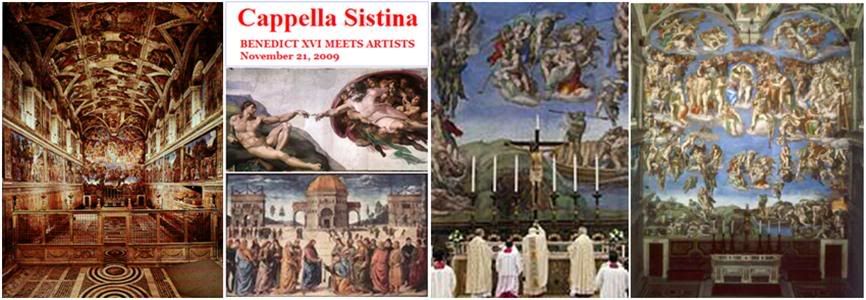 I think the newspaper's headline is too sweeping. The Church does not have to 'win over the art world' in toto. But Pope Benedict XVI can and will inspire some among them to express their sense of God and the transcendent in ways worthy to be a genuine act of worship, i.e., a liturgy of art. The artists interviewed in his article apper to be have that sense already.
British artists speak out
I think the newspaper's headline is too sweeping. The Church does not have to 'win over the art world' in toto. But Pope Benedict XVI can and will inspire some among them to express their sense of God and the transcendent in ways worthy to be a genuine act of worship, i.e., a liturgy of art. The artists interviewed in his article apper to be have that sense already.
British artists speak out
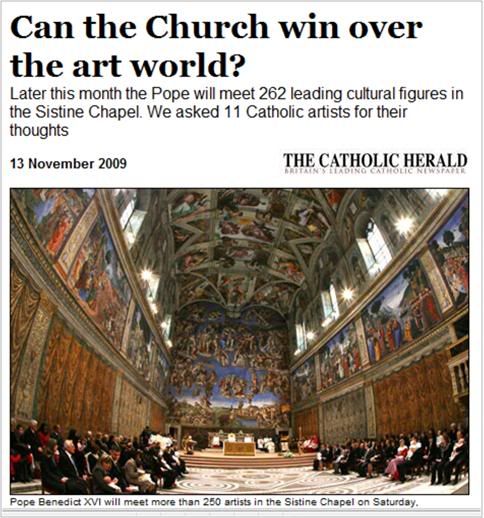 JAMES MACMILLAN
JAMES MACMILLAN, Composer
There has certainly been a breach in the official relationship between artists and the Church. No longer, or so it seems, do the great artists of our time have a close relationship with ecclesial figures who might commission new work from them, as in ancient times.
However, the spiritual quality of the arts has never left the wider consciousness, and it is entirely understandable that the Pope is keen to establish a dialogue.
As his predecessor said famously in his Letter to Artists of 1999: "Even in situations where culture and the Church are far apart, art remains a kind of bridge to religious experience." Only the most prejudiced of secular minds would shrug this off as meaningless and irrelevant.
STEPHEN HOUGH, Pianist
Artists are traditionally loose cannons. Asking them to paint a ceiling, write a motet or sculpt a statue has always been a risk for the churchmen who labour long and hard to keep the theological borders neat and free from weeds. Yet art can elevate the heart and mind above, if not beyond, the cleverest sermon or the clearest catechesis, and, at its best, is a companion to doctrine, not an enemy of it.
MARTIN O'BRIEN, Artistic Director
Ten Ten Theatre, a Catholic theatre-in-education company
based in London.
It seems to me that, here in the UK, a rift has developed between the Church and art not through a lack of inspiration but through a lack of confidence. Like so much of contemporary life, art has been secularised. Given this, it can be difficult for Catholic artists to create and deliver deeply personal pieces of work because they often stand to be ridiculed and rejected. However, I don't believe that we Christian artists should be too militant.
John Paul II called us to "look to the future with commitment to a New Evangelisation, one that is new in ardour, new in methods, and new in its means of expression".
For me, this means getting under the radar of what is commissioned and disseminated. We do this by creating works of quality, by being in the secular world (though not of it) and by being brave in the truth we wish to portray. At times we may fail and we may be ridiculed, but we may also inspire and challenge the norm.
DAVID CLAYTON, Icon writer
Artist-in-Residence.Thomas More College of Liberal Arts
Merrimack, New Hampshire
It goes back to John Paul II's Letter to Artists calling for a dialogue. There are two approaches to the regeneration of culture. One is to look at popular culture and Christianise it; the other is to look at Christian culture and make it good enough so that it becomes popular.
Christianising popular culture immediately creates a conflict. You have to think in terms of the content and the form and the style of it is intrinsically secular. Attempting to Christianise popular culture can only go so far, and to ultimately bring that into Mass is flawed.
If you ask me ultimately how I think this is going to happen, what you need is to once again root Catholic culture in the liturgy and devotional prayer that is ordered to the liturgy.
If you look at all the great traditional art movements, the Baroque grew out of the Counter-Reformation, the Council of Trent. It started as the sacred form but then became the form for everything; the sacred and the profane all pointed to the Mass. If we are going to have a Catholic culture again it has to start as a liturgical culture.
It also needs a three-way dialogue between artists, patrons and the Church.
I wonder how many patrons have been invited [to the Sistine Chapel]. If you ask me who I'd go for first, it would be the patrons, not the artists. The artists do what the patrons want them to do.
PATRICK REYNTIENS, Stained-glass artist
The 1980s and 1990s were absolutely frightful for the Catholic Church and the arts. They went in for plumbing instead.
All Church art from the beginning was local art. The whole of the Italian Renaissance was local art. People in Florence did Florentine things; people in Naples did Neapolitan things.
Albrecht Dürer changed things. He invented self-promotion and put woodcuts and etchings before paintings. He could get 5,000 woodcuts distributed throughout Europe. Everybody became interested in Albrecht Dürer.
The trouble is the Holy See is a victim of publicity: it has only invited people who have a public profile.
MICHAEL NOAKES, Painter
Did a portrait of Benedict XVI in 2007
At the time of the Renaissance the arts were in the forefront of knowledge. It was an exciting time, when it was still possible to have read every book that had ever been written.
Painters understood linear perspective and had learned a great deal about anatomy. This growing understanding and confidence led to some wonderful commissions, with the Church as one of the leading patrons.
This patronage coincided with such painters and sculptors as Michelangelo and Leonardo and architects like Palladio. Without Church support they could not have flourished and Christendom would be robbed of some of its finest works of art.
Now, there are so many calls on the Church throughout the world and the art world is in such turmoil that it is hardly surprising that little money is set aside for art projects. It is a sad vacuum. If only it could once again be filled.
AUSTIN WINKLEY, Church architect
Young artists tend to feel alienated by the Church - especially with that one yardstick that to be a Catholic you have to go to Mass on Sunday. And in England we are a pretty obedient lot and if somebody sets out a rule like that we take it quite literally. Yet our churches and galleries are full of paintings and sculptures of saints and the presence of God in symbolic ways.
Young people have a strong link with spirituality, and I think the arts are very closely linked to the message of Christ and the Church, whether artists know it or not, because of the natural desire for the spiritual.
The dialogue between Romano Guardini [the Italian-born German theologian] and Rudolf Schwartz [the German architect] was inspiring for me. It's that kind of dialogue that we have to encourage.
There are relatively few priests at the moment who are inspiring young artists - though I think we are at the beginning of a new wave. Fr Bruno Healey, Fr Peter Newby [organising the] architects' Mass -_they are examples of the Church reaching out to architects and artists.
LAWRENCE LEW, O.P., Photographer
The fine arts point to and participate in beauty, which, as St Thomas Aquinas reminds us, is most properly appropriated to Christ. Sadly, modern art is seldom orientated towards beauty, which is an objective truth extrinsic to oneself, but is rather directed inwards as a kind of subjective self-expression.
This rift can be healed by a contemplation of beauty, and ultimately of truth, revealed by the light of faith. For without faith one remains blind to God, and therefore one's art can only reflect oneself, which does have a natural goodness but it is not opened to the infinite truth, goodness and beauty of the Divine.
I find that the art of photography requires us to seek and contemplate the beauty of God's work in creation, and to share that beauty with others using the photographer's talent and skill. So, photography can be put to the service of the Church, to lead others to a contemplation of beauty, which is the noble and proper end of the arts.
JOSEPH CAMPO , Executive Producer
Grassroots Films, a Catholic company based in New York.
Its latest feature is The Human Experience
There is not necessarily a rift between art and the Church. The shift is in culture. Culture directly affects art, and art directly affects culture. Since culture is characterised by its art, all you have to do is look at what is being created today to know what the state of affairs really is.
The Catholic Church has produced some of the finest works in the history of the world. The Holy Father is asking artists to use today's new technologies to reflect on the spiritual and physical. This is the job of the artists, to uplift souls with their God-given talents.
As the Holy Father said, a revolution is taking place in the realm of social communications. It is up to us artists to set this revolution into motion. By applying the highest quality available to each work of art - be it music, film, performance or words - only then will truth, beauty and goodness be made manifest, thus reflecting the Divine.
PETER FUDAKOWSKI, Film Producer
His film Tsotsi won the Best Foreign Language Oscar in 2005
I think [the Pope's meeting with artists] is a very good initiative, although I would not really agree with the criticism of artists that they have abandoned "the idea that artwork embodies a transcendent vision of being".
My own experience with the film Tsotsi is that it has been enthusiastically used by Church groups worldwide. The redemptive theme has been used to speak to London homeless, street children in South Africa and countless college groups in the US. It has very often been shown as a fundraiser by parish groups.
To my mind, this proves that, given the right material, film-makers and the Church can co-operate very effectively. I am very often asked to advise on films suitable for Church groups and find that there are plenty, but they are very often films which are not multiplex fare. Sadly the sort of films which are made especially for pastoral use are often very poor quality because they are too earnest.
FRANK COTTRELL BOYCE, Novelist and screenwriter
Holding the symposium in the Sistine Chapel reminds us that Catholics have an astounding artistic heritage to draw on. We tend to idealise art and artists nowadays but the Sistine setting also underlines the fact that great art is parasitic on great power.
The field of modern art in Britain, for instance, is sustained by money from banks and advertisers. And it expresses all the things they want to say - that the individual comes first and that life is meaningless (but you can give it meaning by buying stuff).
I think as a Catholic writer I feel my mission is to do what St Paul said and "think on what is good", to remind people that life, even in the worst circumstances, contains the possibility of joy. In a world which is dominated by governments and corporations that feed on fear and misery, this is a profoundly subversive message.
I used to feel anxious about pushing my Catholicism but in fact the two things I've done that have been most warmly received - Millions and God on Trial - are the things in which I was most upfront and honest about my faith.
 Sign up at
Sign up at
appelloalpapa@gmail.com [Modificato da TERESA BENEDETTA 14/11/2009 18:59] |
| |
 14/11/2009 23:46 14/11/2009 23:46 |
|
| | | OFFLINE | | Post: 18.865
Post: 1.513 | Registrato il: 28/08/2005
Registrato il: 20/01/2009 | Administratore | Utente Veteran | |
|

 The first extended commentary from Cardinal Kasper about the Pope's opening towards Anglicans wishing to convert is featured in the Sunday issue (11/15/09) of L'Osservatore Romano.
'Anglicanorum coetibus':
The first extended commentary from Cardinal Kasper about the Pope's opening towards Anglicans wishing to convert is featured in the Sunday issue (11/15/09) of L'Osservatore Romano.
'Anglicanorum coetibus':
A concrete possibility
not contrary to ecumenism
by Giampaolo Mattei
Translated from the
11/15/09 issue of

The Archbishop of Canterbury , Rowan Williams, Primate of the Anglican Communion, will be in Rome from Nov. 19-22 to participate in a colloquium dedicated to the late Cardinal Johannes Willebrand on the centenary of his birth, to take place Nov, 19 at the Pontifical Gregorian University.
Willebrand was the president of the Pontifical Council for Promoting Christian Unity from 1969-1989.
Williams will contribute an ecumenical testimony, and will most likely "speak about the indisputably positive development of relations between Anglicans and Catholics after Vatican-II", as well as an occasion to take note of the new Apostolic constitution Anglicanorum coetibus.

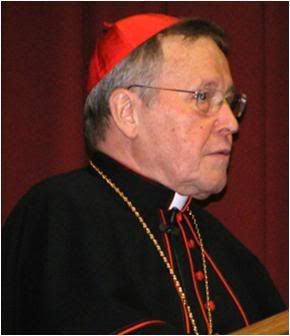
Cardinal Walter Kasper,who succeeded Cardinal Willebrand as Council President, said in an interview with L'Osservatore Romano, that it will also be an occasion to discuss with Williams the new canonical structure devised by Pope Benedict XVI for Anglican communities desiring to convert en masse to the Catholic Church.
"The Archbishop's coming visit to the Vatican", said Kasper, "shows that there is no break at all in Anglican-Catholic relations, and will in fact relaunch the cause of ecumenical dialog at a historic moment".
In this spirit, he said, "the Archbishop of Canterbury will be meeting with members of the Roman Curia, and will meet the Holy Father on November 21. We have the opportunity to open a new phase in the ecumenical dialog which will continue to be a priority of the Catholic Church and of Benedict XVI's Pontificate".
The cardinal said this has been an intense period on the ecumenical front. He recalls getting a late-night telephone call from Archbishop Williams when he was in Cyprus for the 12th meeting of the Mixed International Commission for Theological Dialog between the Catholic and Orthodox Churches.
"We discussed the significance of the new Apostolic Constitution, and I assured him that our direct dialog would continue, as Vatican-II envisioned and as Pope Benedict desires. He said that this confirmation was very important to him".
Kasper said "The Archbishop has kept a balanced attitude since he was informed of the Apostolic Constitution. Our personal relations are cordial and transparent. He is a spiritual man and a theologian. Actually, the only possible obstacles to the ecumenical dialog now could come from internal tensions within the Anglican Communion."
He also pointed out that "The Apostolic Constitution must be understood in the light of Vatican-II and the direct ecumenical dialogs which it led to".
Thus he said, "there were always great hopes for the possibilities of rapprochement because in our dialog, it was evident that we have a common tradition spanning 15 centuries."
He admitted that the expectations were somewhat dampened in recent years because of developments within the Anglican Communion:
"They have allowed women to be ordained as priests, and the consecration of a practising homosexual as bishop, as well as same-sex marriage. These are choices that provoked serious tensions within the Anglican Communion, and also widened the gap with the Catholic Church.
"But the critical response to these developments did not come only from Catholic-leaning Anglicans. Not all those who disagree with the liberal changes want to become Catholics. There are also a significant number of Anglicans who have evangelical [Protestant] inspiration".
Kasper explained the genesis and significance of the new Apostolic Constitution.
"Let us keep to the facts. Groups of Anglicans requested freely and legitimately to enter the Catholic Church. It was not through any initiative of ours. The requests originally came to our Council, and as President, I referred them to the Congregation for the Doctrine of the Faith which has the competence for such matters".
Kasper said he wanted to clear up any equivocations once and for all, "because I have been reading so many unlikely journalistic 'reconstructions' [of the events that led to the AC}".
"Our Council was always kept informed by the CDF, and it is not true that we were kept out of the picture. We did not take part directly in the conversations and correspondence that followed, but we were kept informed, and rightly so. The text of the Apostolic Constitution was prepared by the CDF. We were shown the draft and we made our suggestions."
What prospects are opened by the Apostolic Constitution?
"Of course, we cannot possibly oppose it if an Anglican or a group of Anglicans wishes to enter into full and visible communion with the Catholic Church. The Pope has opened the door for this with benevolence. He has shown a way. He has offered a concrete possiblity which is certainly not contrary to ecumenism.
"Even the Vatican-II decree Unitatis redintegratio made clear that ecumenism and conversion are different matters but are not contradictory. Moreover, the possibility of 'corporate' conversion, as provided for by Anglicanorum coetibus, was always present from the time we began ecumenical dialog with the Anglicans.
"The very fact that ecumenical dialog has gone on with great patience shows that there already is a bridge that unites us, and a closeness that enabled taking such a significant step".
He added [with an apparent reference to Hans Kueng]: "To think as some commentator has said that the Pope with this decision simply wished 'to enlarge his empire' is ridiculous".
But now the difficult part comes. "It is physiological that there will be none-too-easy problems to resolve in a matter that is as sensitive as this. To begin with, there has been quite some confusion about it in the media. And then, it will not be easy to get everyone concerned into immediate accord on particulars. We have to listen to the reasons given by everyone. Then we can evaluate how things are and proceed together, from there".
Kasper warns against 'speaking of abstractions' and suggests that it is best to await developments: "First, we have to know who and how many Anglicans will decided to avail of the opportunity. Only then can we plan more concretely, with dates and places".
He calls for a realistic attitude: "We have to see case by case who these persons and groups are. First of all, one does not become Catholic only because one disagrees with decisions made by your confession. Nor is it just a question of agreeing to sign on officially to the Catechism of the Catholic Church. That is why, it is important not to generalize, and to wait and see."
Based on his experience in long years of dialog with the Anglicans, Kasper anticipates "there are some questions that will not be easy to resolve, problems that have not been specifically considered and which may require complicated solutions."
"Keeping our feet firmly on the ground, one obvious fact is that it will not be an easy decision to make for many Anglican bishops and pastors, from the social and economic aspects. "
Among the practical problems, Kasper cites the problem of breaking up a parish or diocese, when a significant part of it decides to become Catholic. Starting with the church buildings. "Who will decide whether it belongs to the State, the region or the community, or to the Church as institution, and if so, which Church?"
Kasper expresses some perplexity about the Traditional Anglican Communion: "Two years ago, their representatives asked for the group to enter the Catholic Church as a whole. But they have not taken part in conversations since then. Now, they have stepped aboard a train that is already running. That's OK. If they are sincere, the doors are open. But we should not forget that since 1992, they have considered themselves no longer in communion with Canterbury".
[If Kasper refers to conversations that have taken place as ecumenical talks with the Anglican Church, then he is right that the TAC have not taken part, precisely because they have taken themselves apart from the rest of the Anglican Communion. But it was TAC that publicized in July 2008 a letter from Cardinal Levada informing them that the CDF was seriously studying their request to join the Catholic Church en bloc, so it does not seem fair to say that the TAC is simply jumping on board now that the 'train' is under way!]
However, he adds: "One must respect freedom of conscience. Conversion is a personal matter, which avails of the freedom to choose, the freedom of human decision-making. In this respect, one cannot enter that space, one cannot push, one cannot organize".
Kasper also thinks there is nothing to clarify on the question of priestly celibacy since nothing changes in the Church's discipline about this.
"It is obvious that only Anglicans who are already ordained bishops and priests are allowed to remain married, and that this will not be the norm in the future, starting with seminarians who begin studies after they have converted to the Catholic Church".
He said he had also explained the situationw ith the Anglicans to the Orthodox: "In Cyprus, in order to avoid misunderstanding, I immediately told our Orthodox partners that this case was neither proselytism nor a new Uniatism. I also discussed this with the Archbishop of Canterbury, who agreed that there cannot be an Anglican uniatism.
"Uniatism is a historical phenomenon that concerns the Eastern Churches, whereas the Anglicans come from the Latin tradition. On uniatism, the 1993 Ballamand document remains valid, which states that it was a historical phenomenon that is not repeatable, and cannot apply to the present nor in the future".
He said the Orthodox were most interested to understand the nature of the personal ordinariates that the Pope has devised for the Anglicans.
"I made clear," he said, "that the Apostolic Constitution does not create a Church sui iuris [a local Church] and therefore, there will not be a Church leader, but an ordinary [bishop] with vicarial powers".
Finally, Kasper says there will not be any 'negative repercussions' from the Protestants about the Apostolic Constitution. "All Christian leaders understand that the Pope wishes to continue the ecumenical dialog as intended by Vatican-II".
[Modificato da TERESA BENEDETTA 14/11/2009 23:49] |
| |
 15/11/2009 03:24 15/11/2009 03:24 |
|
| | | OFFLINE | | Post: 18.866
Post: 1.514 | Registrato il: 28/08/2005
Registrato il: 20/01/2009 | Administratore | Utente Veteran | |
|
 Pope addresses bishops
Pope addresses bishops
from southern Brazil
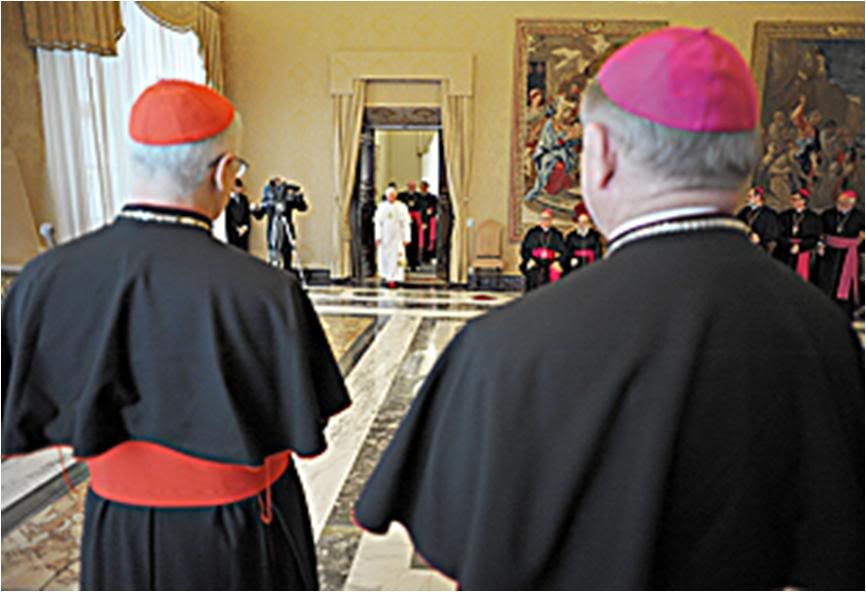
The Holy Father met with the bishops of Brazil from Southern Sector-1 of the world's largest Catholic country in three separate groups earlier this week, and addressed them altogether at the Vatican today.
Here is a translation of the Pope's address, delivered in Portuguese:
Eminent Cardinals,
beloved Archbishops and Bishops of Brazil:
During the visit which you have been making ad limina Apostolorum, you are gathered together today in the home of the Successor to Peter, who welcomes you all with open arms, beloved Pastors of Region South-1, in the state of Sao Paolo.
Located there is that important center of welcome and evangelization that is the shrine of Our Lady Aparecida. which I had the joy of visiting in May 2007 for the opening of the Fifth Conference of Latin American and Caribbean Bishops.
I hope that the seed we sowed at that time may bring valid fruits for the spiritual and even social wellbeing of the populations of your promising continent, of the beloved nation of Brazil and of your Federal State - they who "have the right to a full life befitting children of God, with conditions that should be more humane: free of the menace of hunger and every form of violence" (Address, Aparecida, May 13, 2006, No. 4).
Once again, I wish to thank you for all that has been realized with great generosity, as I renew my heartfelt greeting to you and your respective dioceses, with a particular thought for your priests, consecrated persons and lay faithful who help you in the work of evangelization and Christian inspiration of society.
Your people keep in their hearts a great religious sentiment and noble traditions, rooted in Christianity, which are expressed in deeply felt religious and civilian manifestations.
It is a patrimony rich in values that you - as your accounts have shown, and as Mons. Nelson Wastrupp referred to in his kind words expressed in your behalf - have been seeking to maintain, defend, disseminate, know deeper, and continuously enliven.
As I rejoice sincerely for all this, I call on you to continue your work of constant and methodical evangelization, ever aware that authentically Christian formation of consciences is decisive for a profound life of faith, and even for social maturation and for the genuine, balanced wellbeing of the human community.
Indeed, to merit the title of community, a human group should correspond, in its organization and its objectives, to the fundamental aspirations of the human being. For this, it is not exaggerated to say that an authentic social life begins in the consciousness of every person.
The teaching of the Church - for its origin, God; for its content, the truth; and its point of support, the conscience - finds a profound and persuasive echo in the heart of every person, believer or not.
Concretely, "the question of life, and its defense and promotion, is not a prerogative of Christians alone. Although it receives light and extraordinary force from the faith, the task belongs to every human conscience that aspires to the truth and is attentive and thoughtful about the future of humanity... The 'people of life' rejoice to be able to share their task with so many others, so that there may ever be more 'people of life', and that the new culture of love and of solidarity may grow for the true good of the city of man" (Enc. Evangelium vitae, March 25, 1995, n. 101).
Venerated Brothers, speak to the heart of your people, awaken their consciences, reunite their wills in a commonn action against the growing wave of violence and scorn for the human being.
The latter, from being a gift of God welcomed in the loving intimacy of matrimony between a man and a woman, has come to be seen as a mere human product.
"A particularly crucial battleground in today's cultural struggle between the supremacy of technology and human moral responsibility is the field of bioethics, where the very possibility of integral human development is radically called into question.
"In this most delicate and critical area, the fundamental question asserts itself forcefully: is man the product of his own labours or does he depend on God?
"Scientific discoveries in this field and the possibilities of technological intervention seem so advanced as to force a choice" between two types of reasoning: reason open to transcendence or reason closed within immanence. (Caritas in veritate, 74).
Job, in a provocative way, invites irrational beings to give their own testimony: "But now ask the beasts to teach you, and the birds of the air to tell you; Or the reptiles on earth to instruct you, and the fish of the sea to inform you. Which of all these does not know that the hand of God has done this? In his hand is the soul of every living thing, and the life breath of all mankind" (Job 12,7-10).
The conviction of right reason and the certainty of the faith - for which the life of the human being, from conception to natural death, belongs to God and not to man - confers on him that sacred character and personal dignity that inspire the only legally and morally correct attitude, namely, profound respect.
The Lord of life has said: "I will demand an accounting of the life of man from man, and from each of his brothers... because man was made in the image of God" (Jn 9,5-6).
My beloved and venerated brothers, we can never be discouraged in our appeal to consciences. We will not be faithful followers of our Divine Master if on all occasions, even the most difficult, we do not know how to remain firm "in the hope against all hope" (Rom 4,18).
Continue to work for the triumph of the cause of God, not with the sad spirit of one who notes only deficiencies and dangers, but with the firm confidence of one who knows he can count on the victory of
Christ.
United to the Lord in an ineffable way is Mary, fully conformed to her Son, victor over sin and death.
Through the intercession of Our Lady of Aparecida, I implore God for light, comfort, strength, intensity of plans and their realization for you and your direct co-workers, while at the same time, I impart from the heart a special Apostolic blessing which I extend to all the faithful in each of your diocesan communities.
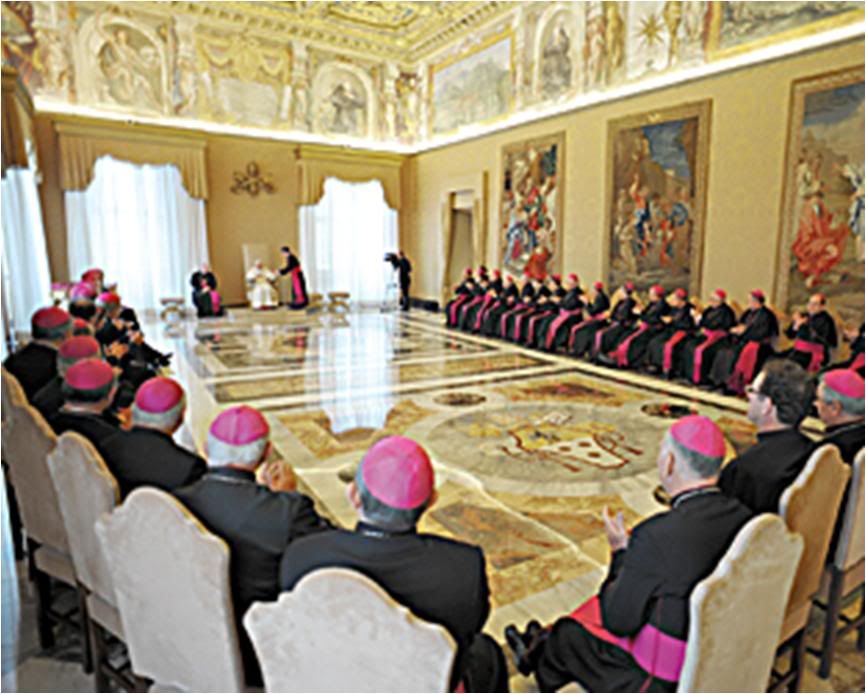 Brazil is so large, both in physical land areas, as well as in population, that a quick review of its Catholic statistics is in order:
Brazil is so large, both in physical land areas, as well as in population, that a quick review of its Catholic statistics is in order:

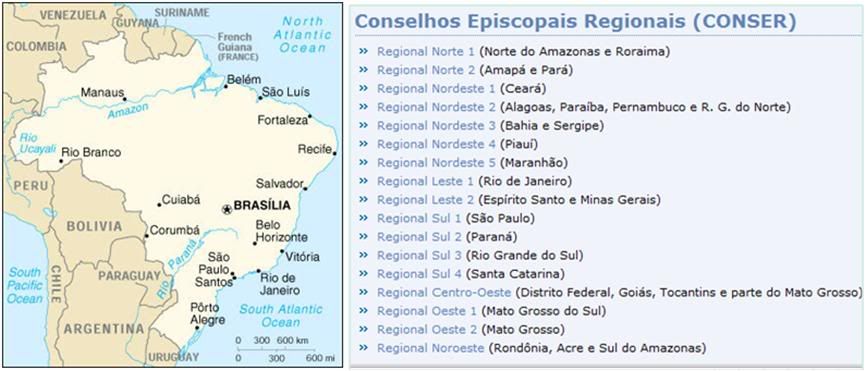
 The blue-shaded area on the map, left, represents the South Sector-1 from which this week's visiting bishops come from. The map on the right shows the various regions of Brazil, which has a total of 267 dioceses.
For more Catholic statistics on Brazil, see
www.catholic-hierarchy.org/country/scbr1.html
The blue-shaded area on the map, left, represents the South Sector-1 from which this week's visiting bishops come from. The map on the right shows the various regions of Brazil, which has a total of 267 dioceses.
For more Catholic statistics on Brazil, see
www.catholic-hierarchy.org/country/scbr1.html
[Modificato da TERESA BENEDETTA 15/11/2009 03:39] |
| |
|
|
|
|